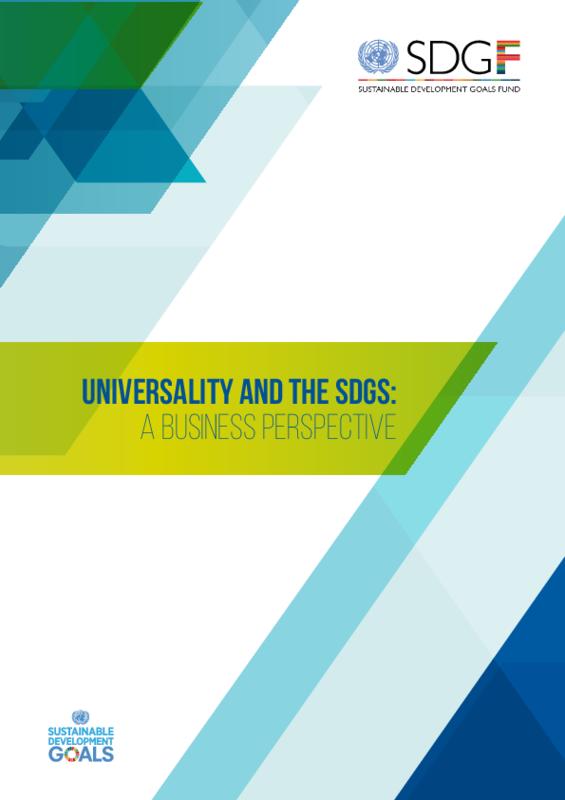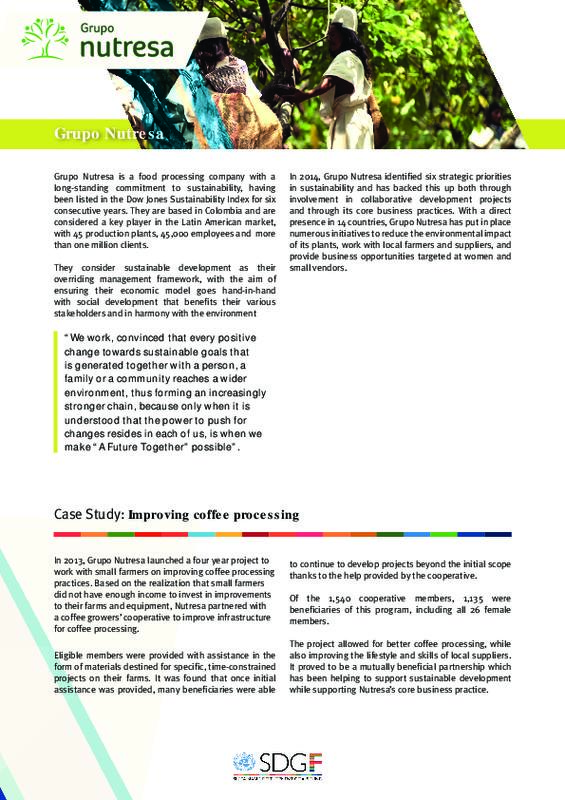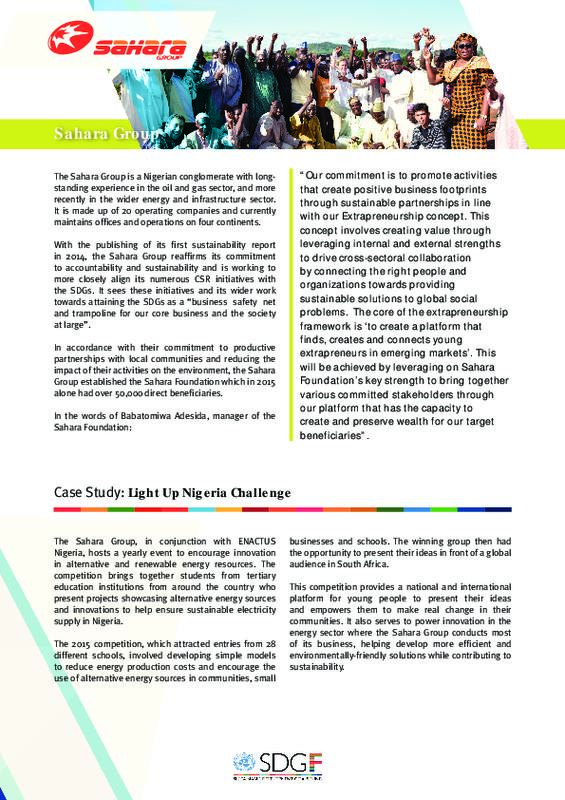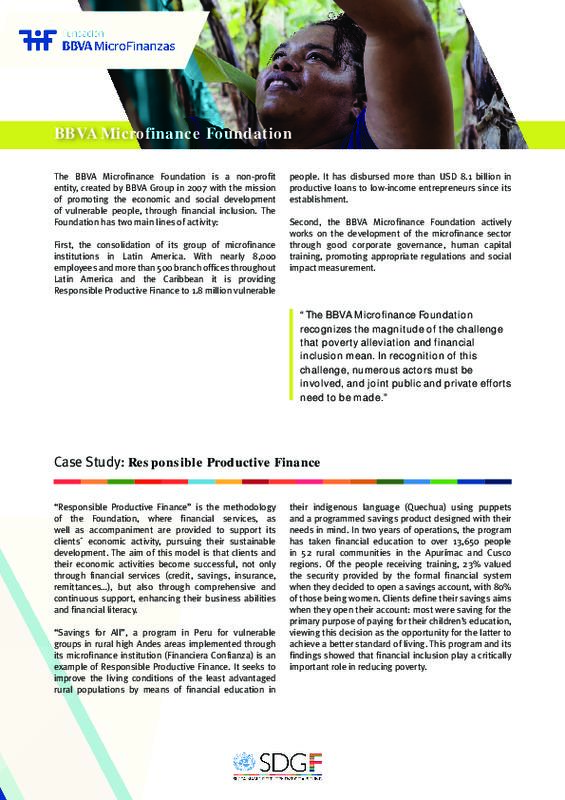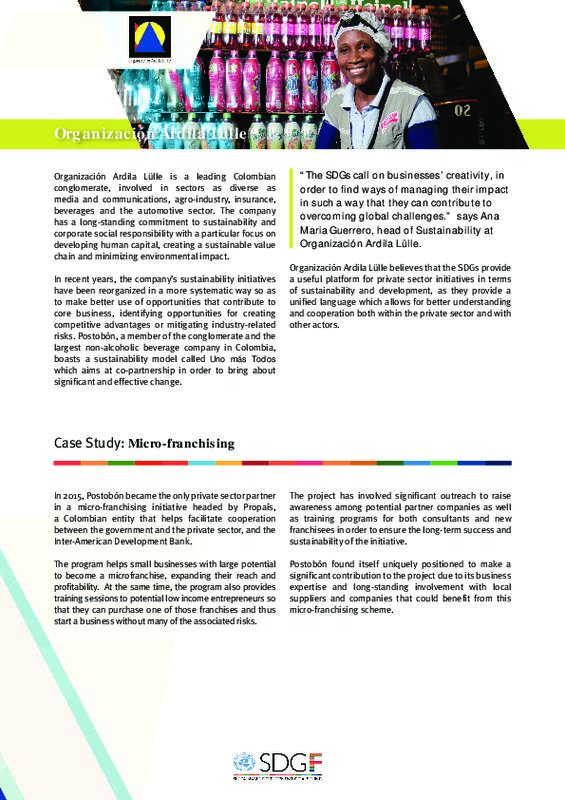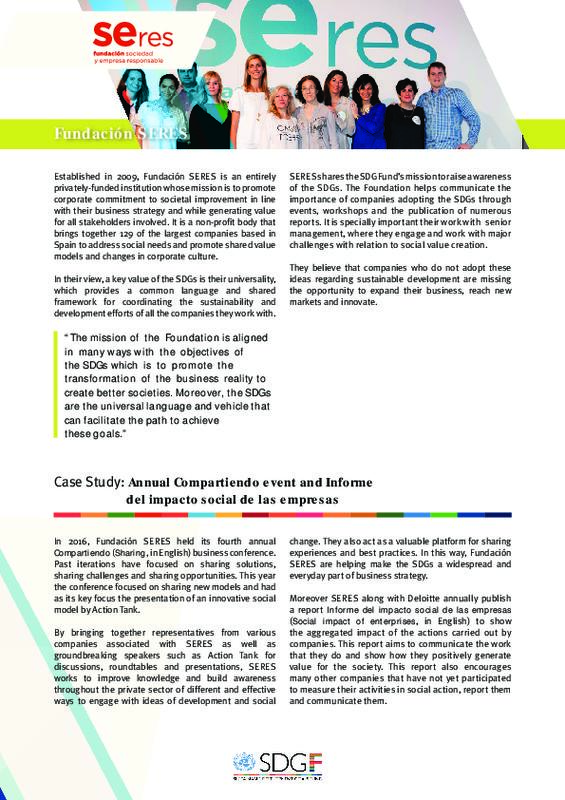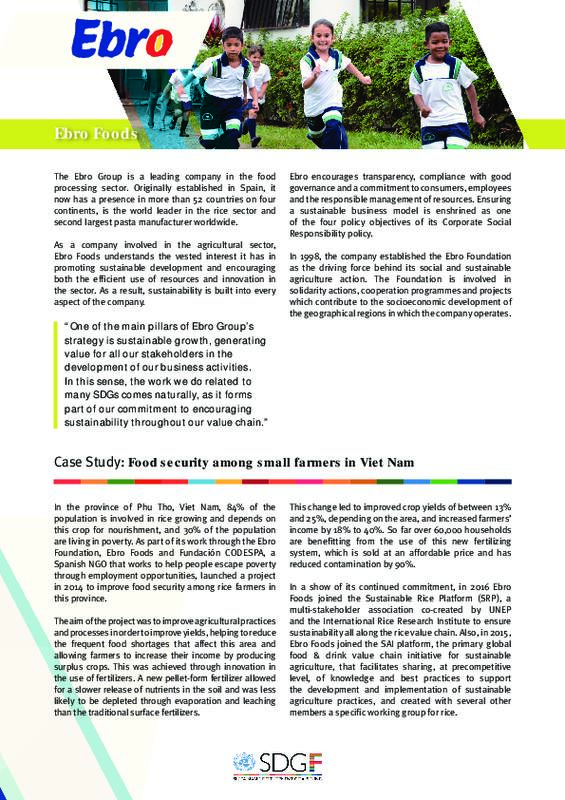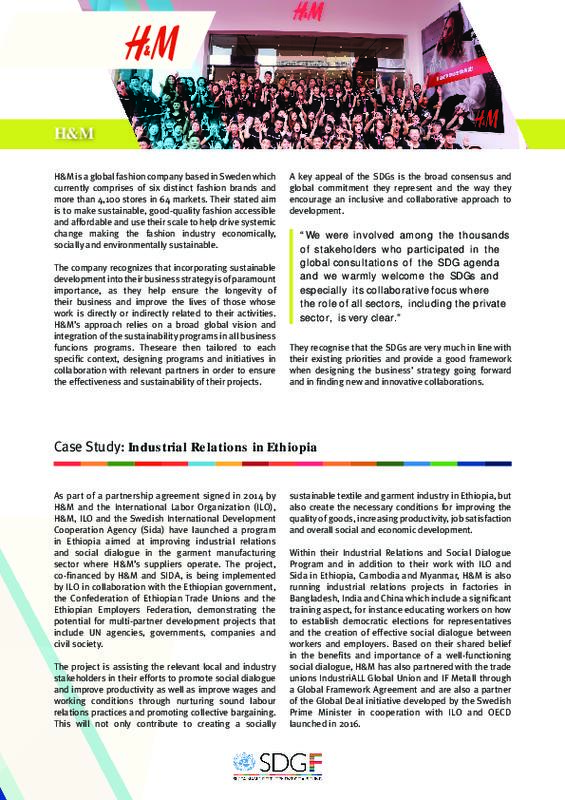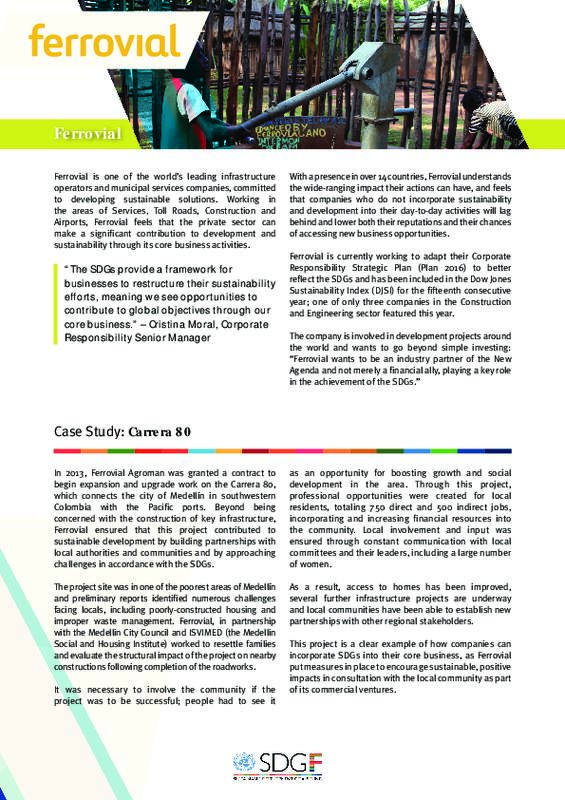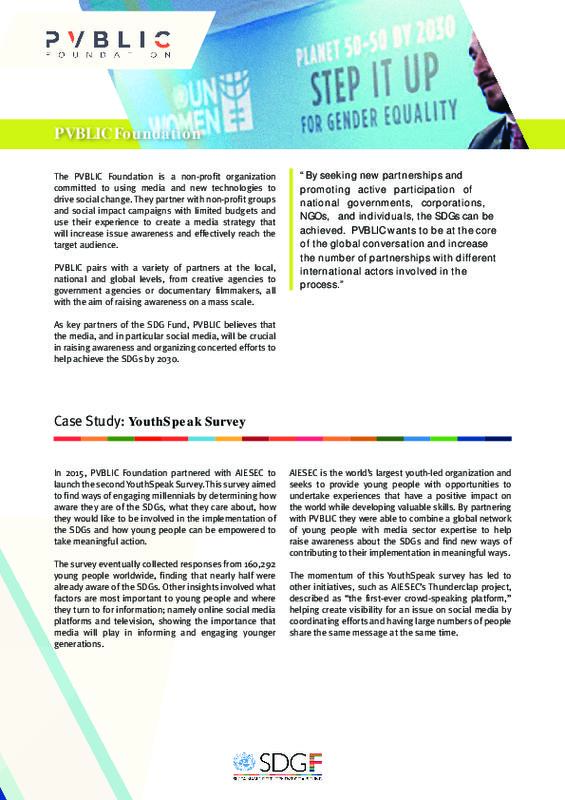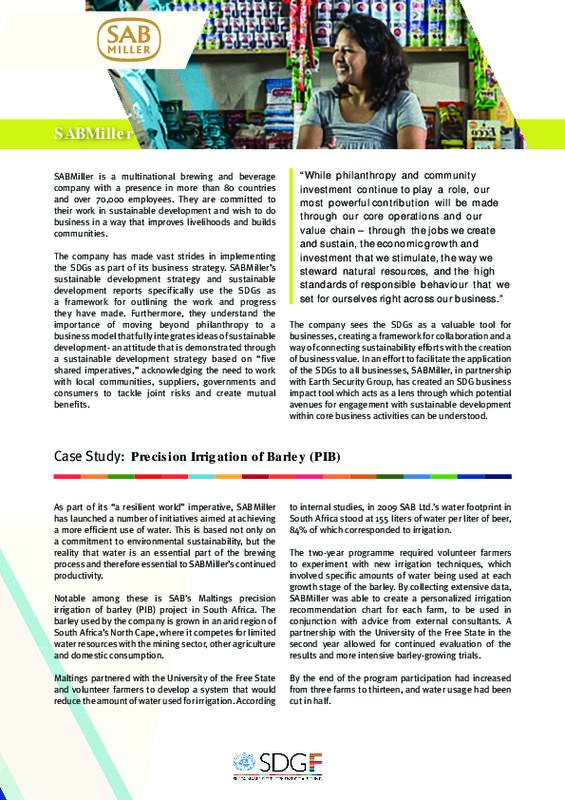Universality and the SDGs:
A Business Perspective
The SDG Fund in collaboration with its Private Sector Advisory Group and the Global Compact highlights varied perspectives from both large and small companies working to understand the commonality of the new development agenda.
This report is based on interviews and input from private sector leaders through workshops in Africa, Latin America, Europe and the United States, with more than 100 firms representing various regions and industry sectors. The year-long series of workshops and interactive discussions provided valuable insight in to how companies were working to address the new set of goals. It also suggests many firms are working in the areas of SDGs, yet their work is not always linked to the goals or articulated as such.
Table of Contents:
FOREWORD
1. INTRODUCTION: UNIVERSALITY IN PRACTICE
- 1.1. The Sustainable Development Fund and partnership with the private sector
- 1.2. Meaning of Universality in a UN Context
- 1.3. Why is the SDG Agenda universal?
- 1.4. Workshop and report methodology: Exploring Universality in the business context
2. BUSINESS CONTRIBUTION TO A UNIVERSAL SUSTAINABLE AGENDA
- 2.1. How is this universal agenda relevant to business?
- 2.2. How are companies adapting these 17 universal goals to their specific context?
- 2.3. What challenges are companies facing?
- 2.4. Overcoming the challenges
- 2.5. Communicating on SDGs’ performance
3. CASE STUDIES
4. TOOLS FOR BUSINESSES
- 4.1. The UN Global Compact and the SDG Compass: Aligning business strategies
- 4.2. Local Dimensions of the Global Agenda: Local Networks
CONCLUSION
FOREWORD
One year ago, the SDG Fund´s Private Sector Advisory Group launched its first report with a clear objective: to understand how the United Nations and the private sector could better work together and partner to achieve the new Sustainable Development Goals. The 2030 Agenda for Sustainable Development clearly recognizes a prominent role for the private sector. Alliances and innovative partnerships between governments, businesses, civil society and UN Agencies are also clearly central to meeting the needs of such an ambitious agenda. Most telling from the report was a key conclusion: businesses want and need to be brought to the table from the very start. Developing partnerships and initiatives must mean that relationships are aligned from the beginning. For companies, true collaboration often means co-investment, but also working to codesign and participating in the implementation and evaluation process. At the SDG Fund, a multi-donor and multi-agency UN mechanism, we are taking these conclusions to heart, and as a result we are eager to continue to devise a greater understanding of engagement as well as build on a new generation of public-private partnerships in the field.
Tackling some of the most pressing challenges requires a diverse array of investment and impetus from both governments and businesses. Now, one year into the SDG implementation, our second report sets out to address another key feature of the 2030 Agenda: universality. With this report, the SDG Fund intends to shed light on the practical business aspects of the concept of universality and bring the business perspective to the forefront. The fact is that universality offers a clear message for achieving the SDGs in a more inclusive way, leaving no one behind. The concept also envisions a strong role for businesses, both large and small, across all countries and sectors to engage with the SDGs. This means that businesses need to understand the compelling case for the SDGs, determine methods to incorporate them in their activities, and ultimately find ways to make them part of their organizational culture, reporting systems and operations.
The report process stemmed from 5 regional workshops and an accompanying survey that allowed the SDG Fund to engage in a focused dialogue with almost 100 companies (and their leadership), representing enterprises of all sizes, sectors and regions. This report aims to reflect their inputs and voices along with those of the SDG Fund´s Private Sector Advisory Group.
After providing an initial overview on the concept of universality, the SDGs and the link to varied business activities, our findings highlighted four main conclusions:
- First, many companies admitted that they did not fully comprehend the depth of the SDGs and, in some cases, how to best implement them, while others were fully embedding the SDGs into their planning processes and current initiatives. In some cases, companies were already contributing directly to the achievement of one or several of the 17 Goals. This is clearly indicative of the need for governments, UN and development actors to strengthen our communication and outreach efforts to ensure that the SDGs are understood, not only by the private sector, but also by citizens, whose behaviors, attitudes and priorities will determine business operations.
- Second, sustainability, understood in its three dimensions (economic, social and environmental), is the key feature that seems to allow companies to connect with the SDGs. Most companies understand that sustainability is essential for their long term success and to operate and thrive in new markets. The notion of sustainability allows companies to make a significant contribution to the SDGs, often through their core operations. Not surprisingly, this is happening not only among large multinationals but also with some of the SMEs that participated in this study. Organizations such as Global Compact, the Global Reporting Initiative, the World Resource Institute or UNDP´s Business Call to Action are developing useful tools for companies, but according to our findings, only a small selection of the companies participating in this research are benefiting from such learnings. Expanded training on the use of these tools as well as creating new resources will be a key priority going forward.
- Third, many companies see an added value to building their sustainability plans around the SDGs. This is because they provide an overarching and globallyendorsed framework that can bring together all their current corporate social responsibility, sustainability and environmentally-friendly initiatives. By providing a common language and set of targets, it allows for better communication and collaboration between actors, resulting in a more effective use of companies’ resources and human capital when it comes to sustainability and development initiatives.
- Finally, in spite of a clear willingness and interest in partnering with public and private sector actors, business are still lacking viable opportunities for engaging in crucial multi-stakeholder partnerships. Overall, business are eager to work with the UN and find the UN to be an important partner for convening programs, especially linked to development initiatives that are innovative, inclusive and otherwise perceived as somewhat risky. The report includes some examples of public-private partnerships that the SDG Fund has established in Nigeria, Viet Nam, Mozambique and the occupied Palestinian territory. This is a critical aspect that will be the focus of the SDG Fund in the next few years.
I want to thank all our partners that have been engaged in the process of preparing this report. First, to the companies that have shared their insight and experience, particularly to the member companies of the SDG Fund´s Private Sector Advisory Group. In the last two years, their commitment, creativity, and much needed input has allowed us a greater understanding of how to partner in achieving the SDGs. For this report Nutresa, Organización Ardila Lülle, Fundación Seres, Sahara Group and BBVA Microfinance Foundation, supported us in our efforts to organize regional workshops. A special thanks also to the Global Compact and its local networks that moderated all of the workshops and produced a description of tools already available for companies interested in the SDGs. Especially, thank you to Javier Cortes, responsible for local networks of Global Compact in the Americas. He prepared the first draft explaining the GC compass tool incorporated in the last part of this report. Also, a heartfelt thank you to Ignacio Alvaro, who analyzed the qualitative data (interviews, surveys, transcriptions of workshops) and collected this important reflection and report from the participating companies.
I also would like to use this chance to give thanks to the whole team in the SDG Fund. Huan Xiao coordinated the final version; Rebeca Huete who prepared the report’s concept note and questionnaires; Nuria Diez del Corral prepared case studies; Teresa Burelli coordinated the work with PSAG; Karen Newman facilitated valuable comments to the final draft; Raul de Mora coordinated the process for editing and design; the whole team was completely committed and I’m very grateful for it.
While going through this report, the reader will find as many answers as questions on how to bring businesses to the forefront of this universal agenda. This we believe is an integral part of the starting point for this report. The 2030 Agenda and its SDGs are the universal property of governments, of international development organizations, of communities, of businesses. But as a universal asset we need to better understand the agenda, and protect it as a collective mandate for the next 14 years. This will be the crux of the SDG Fund´s vision and future work.
Paloma Durán,
Director, Sustainable Development Goals Fund
INTRODUCTION:
UNIVERSALITY IN PRACTICE
The Sustainable Development Goals Fund and partnership with the private sector
The Sustainable Development Goals Fund (SDG Fund) is an international, multi-donor and multi-agency development mechanism established in 2014 by the United Nations Development Programme to work across the UN System. The SDG Fund builds on the experience, knowledge, lessons learned and best practices of the Millennium Development Goals (MDG) experience, while expanding its activities towards sustainable development and a stronger focus on public-private partnerships. It brings together UN agencies, national governments, academia, civil society and businesses to support sustainable development activities through integrated and multidimensional joint programmes. All programmes are facilitated in a “co-design, co-implement and co-finance” fashion and bring together an average of three UN agencies per programme. Currently operating in 23 countries, SDG Fund joint programmes are directly improving the lives of more than 1.4 million people.
To better align public-private partnerships for sustainable development, the SDG Fund established a Private Sector Advisory Group (PSAG) in April 2015, formed by business leaders from various industries worldwide. These leaders are helping the SDG Fund to build a roadmap of how public-private alliances can provide large-scale solutions for achieving the SDGs. The PSAG bi-annual meeting brings companies together to collaborate and discuss practical solutions pertaining to the common challenges of contemporary sustainability. Day-to-day, PSAG members work closely with the SDG Fund, offering suggestions on how to work more effectively with one another at the national level and provide strategic support to achieve better development results in coordination with the private sector.
In November 2015, the SDG Fund launched a report on Business and the United Nations in conjunction with Harvard`s Kennedy School and Business Fights Poverty, based on insights and best practices collected from interviews with business leaders representing a select group of companies from several regions of the world, and a variety of industries that make up the Private Sector Advisory Group. The report outlined the business and development case for increased UN-business engagement as well as recommendations on how the UN can work more effectively on this shared imperative.
As major drivers of inclusive economic growth and job creation, and an important partner in achieving the 2030 Agenda, businesses and the private sector realize the pressing need to understand how they relate to the universality aspect of the SDGs. This maintains that the SDGs are applicable to all, including the private sector. Much like Member States, businesses need to integrate the 2030 Agenda into their strategies and actions according to their distinct situation. Bearing this in mind, the SDG Fund consulted members of the PSAG during its bi-annual meetings in November 2015 and May 2016 to jointly work on a report discussing what the universal dimension of sustainable development means for business actors, why the 2030 Agenda is relevant and how it could provide guidance to businesses.
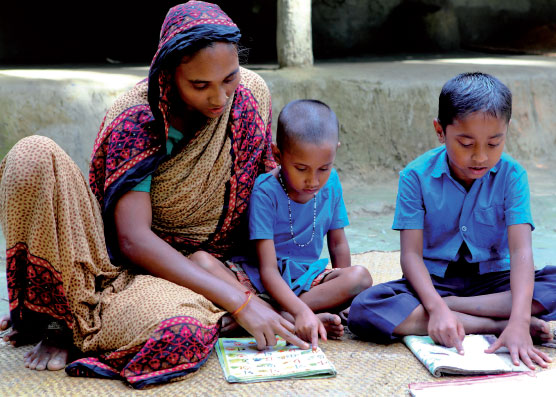
Definition of Universality within the context of the UN
The SDGs call for collaborative partnerships between all countries and stakeholders, ensuring that none are excluded. It is an inclusive and universal agenda, built on the co-ownership of all actors and on the understanding that these shared common goals will only be achieved through collaboration and collective action in a transparent, interlinked, universal space. It is a worldwide goal, requiring international cooperation and joint responsibility. To better translate the concept of “universality” into practice requires clarity on the meaning of the term and what it implies, which will also help facilitate consensus towards achieving the SDGs.
The UN Charter and the Universal Declaration of Human Rights were among the first international agreements to frame the notion of “universality”. Since then, this term has been used in the context of common principles and standards. Sustainable development was established as a universal agenda at the Rio Summit of 1992. Twenty years later, the Rio +20 outcome document, ‘The Future We Want,’ underscored that the United Nations has a universal and central role to play in establishing an inclusive and effective multilateral system to better address the global challenges of sustainable development. ‘The Future We Want’ also reaffirmed that “sustainable development goals should be … global in nature and universally applicable to all countries, while taking into account different national realities, capacities and levels of development and respecting national policies and priorities”1.
Given the various definitions of universality that exist, the United Nations Environment Programme (UNEP) and the United Nations Human Rights Office of the High Commissioner (OHCHR) have put forward a four-part notion of universality: 1) universality requires the recognition of universal principles, standards and values applicable to all countries and all peoples; 2) universality means recognizing the interconnectedness of national and global development challenges, and therefore universal commitments to address them; 3) universality actions at the national, regional and global level, as well as international cooperation and accountability to all citizens.
Also within the UN system is the United Nations Global Compact, which provides a platform for businesses to commit to universal principles in the areas of human rights, labour, the environment and anti-corruption that are based on UN conventions. With a UN General Assembly mandate “to advance United Nations values and responsible business practices within the United Nations System and among the global business community”4 the UN Global Compact works to translate the SDGs into action.
Another leading entity in the study of universality in sustainable development is the World Resource Institute. 5 With a focus on universality, integration and policy coherence, early SDG implementation in OECD countries was examined, especially with regards to how these countries are beginning to reevaluate and reshape domestic agendas to bring them in line with the 2030 Agenda. Universality is defined here as “the need for all countries to internalize their interdependencies in their actions, to consider how domestic actions impact other countries and the global commons, and also to take account of new actors who may constrain as well as shape national policies – notably global corporates and civil society networks”6.
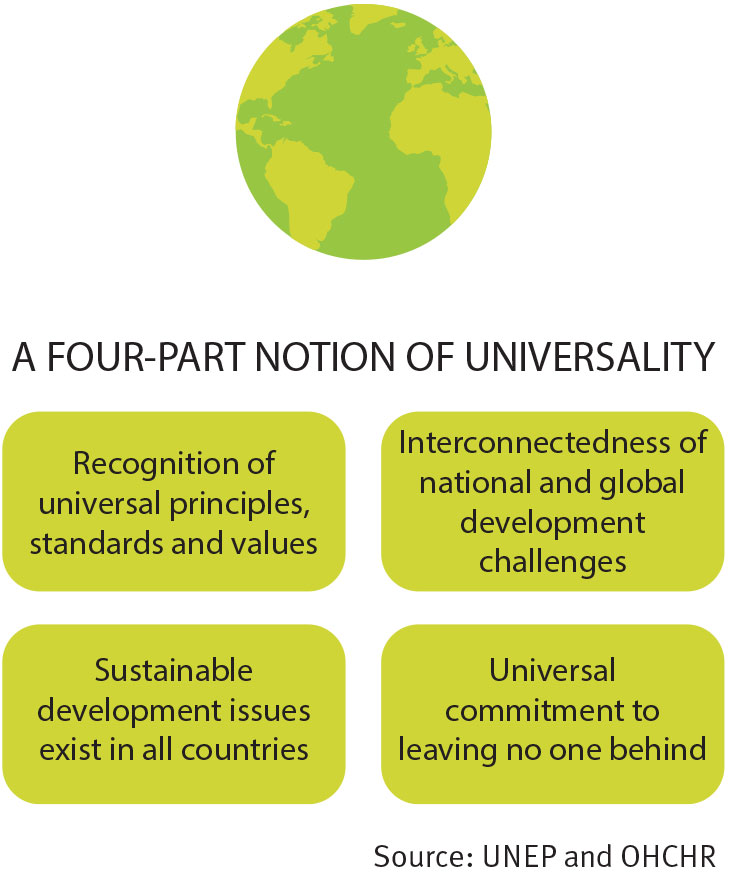
The definition of universality as it relates to the UN has therefore been clearly established and helps integrate all Member States into the new agenda. Universality in the SDGs requires the inclusion of all, extending common but differentiated responsibilities to all people, countries and actors.
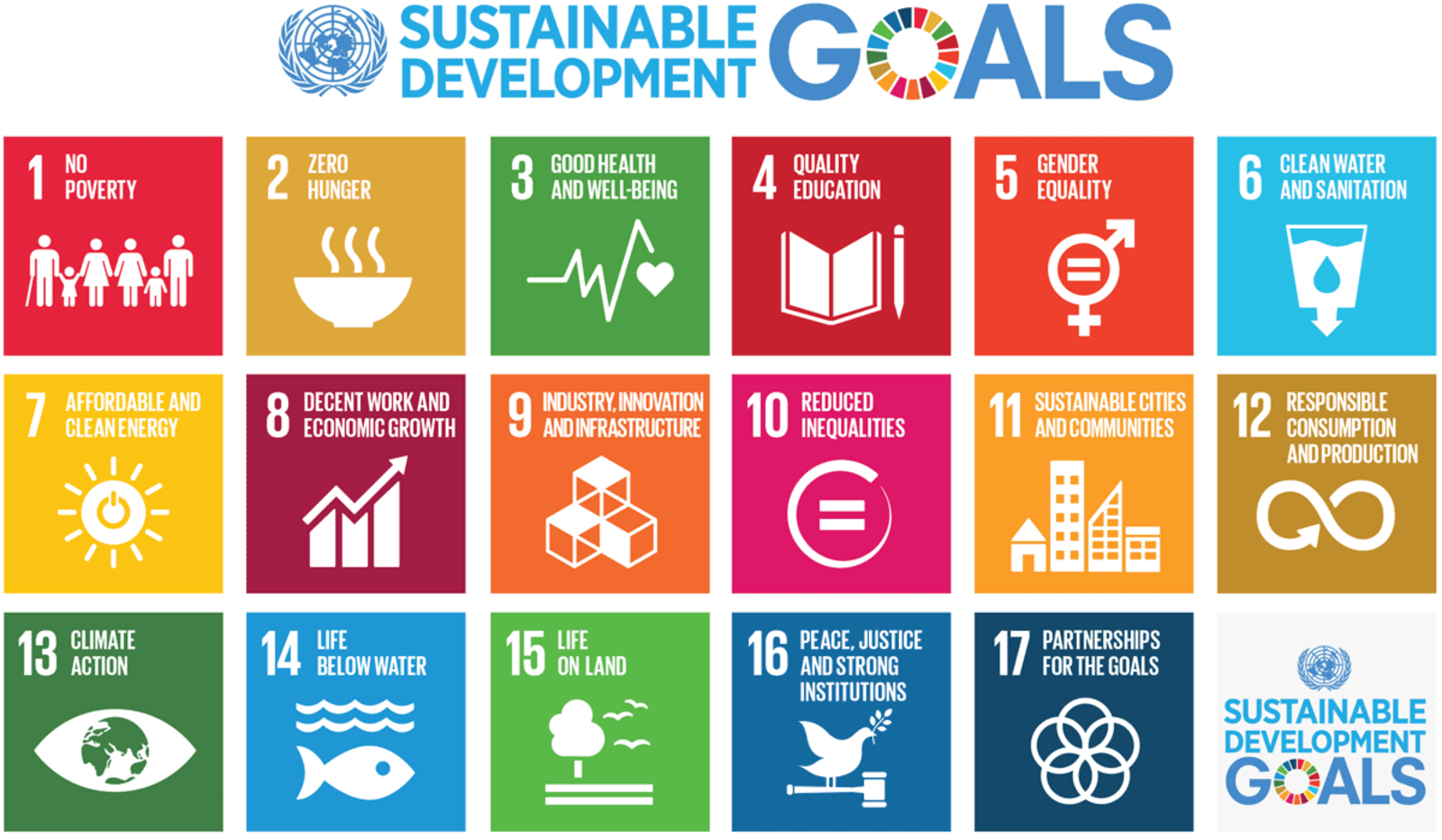
Fig 1: The Sustainable Development Goals
1 A/RES/66/288* Resolution adopted by the General Assembly on 27 July 2012, The future we want
2 UNEP Post 2015 Note #9, Universality in the Post 2015 Sustainable Development Agenda
3 A/RES/70/1 Resolution adopted by the General Assembly on 25 September 2015, Transforming our world: the 2030 Agenda for Sustainable Development
4A/RES/70/224
5 The World Resources Institute (WRI) is a non-governmental global research organization. http://www.wri.org/
6 Universality, Integration, and Policy Coherence for Sustainable Development: Early SDG Implementation in Selected OECD Countries, World Resource Institute
Why is the SDG Agenda universal?
The “principle of universality” has been widely characterized as a foundational value of the SDGs– and also one of its more innovative ones. It has a long-standing tradition in the UN system and underlies much of its normative work, for instance in the realm of human rights. However, its application has usually been confined to specific regulatory frameworks, not to an all-encompassing programmatic agenda. Unlike the previous MDGs, which were conceived mainly as an agenda for development centered on attaining a set of basic, minimum living standards in developing countries, the 2030 Agenda is universal in scope7.
Universal means that the subject belongs or extends to all countries and their people. The SDG Agenda is no longer about developed and developing countries, the rich and the poor; it now extends worldwide. The agenda commits all countries to contribute towards a comprehensive effort for global sustainability in all its dimensions – social, economic and environmental – while ensuring equity, peace and security. These goals show that our society, from each individual to every collective organization, has an agenda to achieve and that sustainable development has become a must for all if the world is to survive and progress is to be shared.
It is also time to learn from recent history using the MDG experience. In 2000, the UN committed itself to eight ambitious MDGs for reducing global poverty by 2015. And it worked. From 1990 to 2010 the number of people living in extreme poverty was cut in half, from 43% to 21% of the world’s population8. The MDGs helped to make the claim for poverty eradication global, bringing the attention and support of not only governments and aid institutions, but new philanthropic organizations and some private sector organizations and corporations. Additionally, this was the first time all UN Member States have agreed to name and quantify international development goals, which has helped to align and mainstream development strategies and efforts towards common objectives.
Economic growth in developing countries did not necessarily lead to development, as it failed to address the issues of inequality and environmental risk. Many local and foreign investments did not permeate to create a more inclusive and sustained human progress. The MDG approach was primarily based on government-led initiatives, with business involvement limited to an ad hoc basis. For a number of reasons, a structured framework for engagement of the private sector with the MDGs was never offered.9
Given the uneven situation with poverty, a great deal of work is left. According to latest data available (2013) from the World Bank, over 750 million people still live with less than 1.90 USD/day.10 The changing geography of poverty will pose many development challenges over the next 20 years, particularly in light of the recent economic downturn and its general impact on the population and livelihoods. 11
These great global challenges will require innovative approaches and new partnerships to promote responsible public and private investment, sustainable public engagement and collective action.
Fortunately, times have changed and awareness regarding the potential role and contribution of the private sector in addressing some of the global development challenges has significantly evolved. The new international commitments emanating from the Busan partnership for Effective Development12 in 2011, the Addis Ababa Action Agenda in 201513 and the 2030 Agenda for Sustainable Development14 call for greater private sector participation in the design and implementation of development policies and strategies to foster sustainable growth and poverty reduction, and to innovate financial mechanisms to mobilize private financing for the sustainable development agenda.
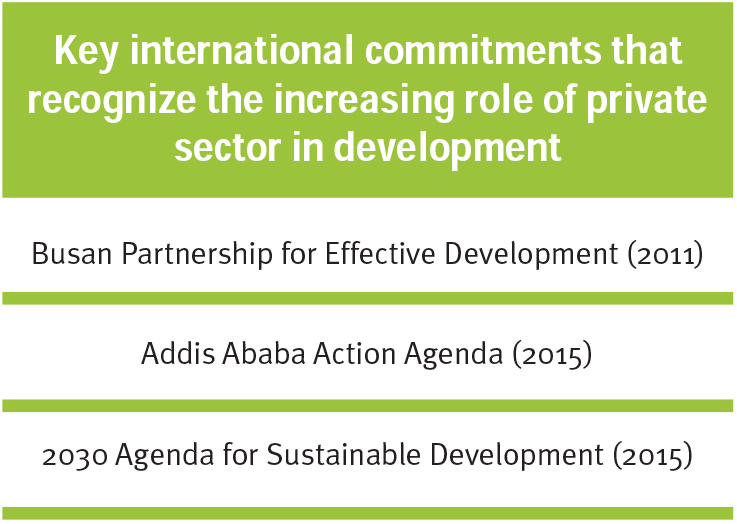
7 Universality and the 2030 Agenda for Sustainable Development from a UNDG Lens. Available from https://www.un.org/ecosoc/sites/www.un.org.ecosoc/files/files/en/qcpr/undg-discussion-note-on-universality-and-2030-agenda.pdf
8 World Bank, World Development Indicators, updated 14 October 2016. Available from http://data.worldbank.org/data-catalog/world-development-indicators
9 Universality and the 2030 Agenda for Sustainable Development from a UNDG Lens. Available from https://www.un.org/ecosoc/sites/www.un.org.ecosoc/files/files/en/qcpr/un...
10 World Bank, “Poverty Overview”, Available from http://www. worldbank.org/en/topic/poverty/overview (accessed 2 October 2016
11 Veronika Penciakova, Laurence Chandy, and Natasha Ledlie, “The Final Countdown: Prospects for Ending Extreme Poverty by 2030”,
(Brookings, 2013). Available from https://www.brookings.edu/research/the-final-countdown-prospects-for-end...
12 Additional information on the Busan Partnership for Effective Development Co-operation is available from http://www.oecd.org/development/effectiveness/busanpartnership.htm
13 Additional information on the Addis Ababa Action Agenda is available from http://www.un.org/esa/ffd/ffd3/press-release/countries-reach-historic-ag...
14 Additional information on the 2030 Agenda is available
from https://sustainabledevelopment.un.org/post2015/transformingourworld
Workshop and report methodology: Exploring universality in the business context
To explore the concept of universality in the context of what it means for the private sector, and to communicate the necessity of understanding the universality perspective of SDGs for companies, the SDG Fund has conducted five workshops in Nigeria (Abuja), the United States (Houston), Spain (Madrid) and Colombia (Bogotá and Medellín). Co-organized by PSAG members Sahara Group, BBVA Microfinance Foundation, Seres Foundation, Grupo Nutresa, and Organización Ardila Lülle, the workshops aimed to raise awareness about the SDGs and to learn how businesses are engaging with the 2030 Agenda. The Fund has brought together nearly 100 private sector actors to explore the universality concept in practice. The workshops aimed to involve companies that differed in terms of size, sector and regions of operation. Background information on universality and the SDGs was sent to workshop participants ahead of time. The SDG Fund also developed a questionnaire to facilitate effective discussion at the workshops and help achieve meaningful outcomes. All workshops were moderated by United Nations Global Compact representatives, utilizing their expertise and experience interacting with the private sector.
The outcomes of these groups were recommendations and suggestions concerning their challenges and experiences. Many of the reflections by workshop participants and questionnaire respondents, when found relevant with the overall analysis, have been included in the report.
The five in-person workshops and 41 questionnaires received from workshop attendees form the basis of this report. The group of 93 companies that have contributed are referred throughout the report as participants or participating companies, in all cases referring to the overall group, or specific percentages according to the contact analysis.
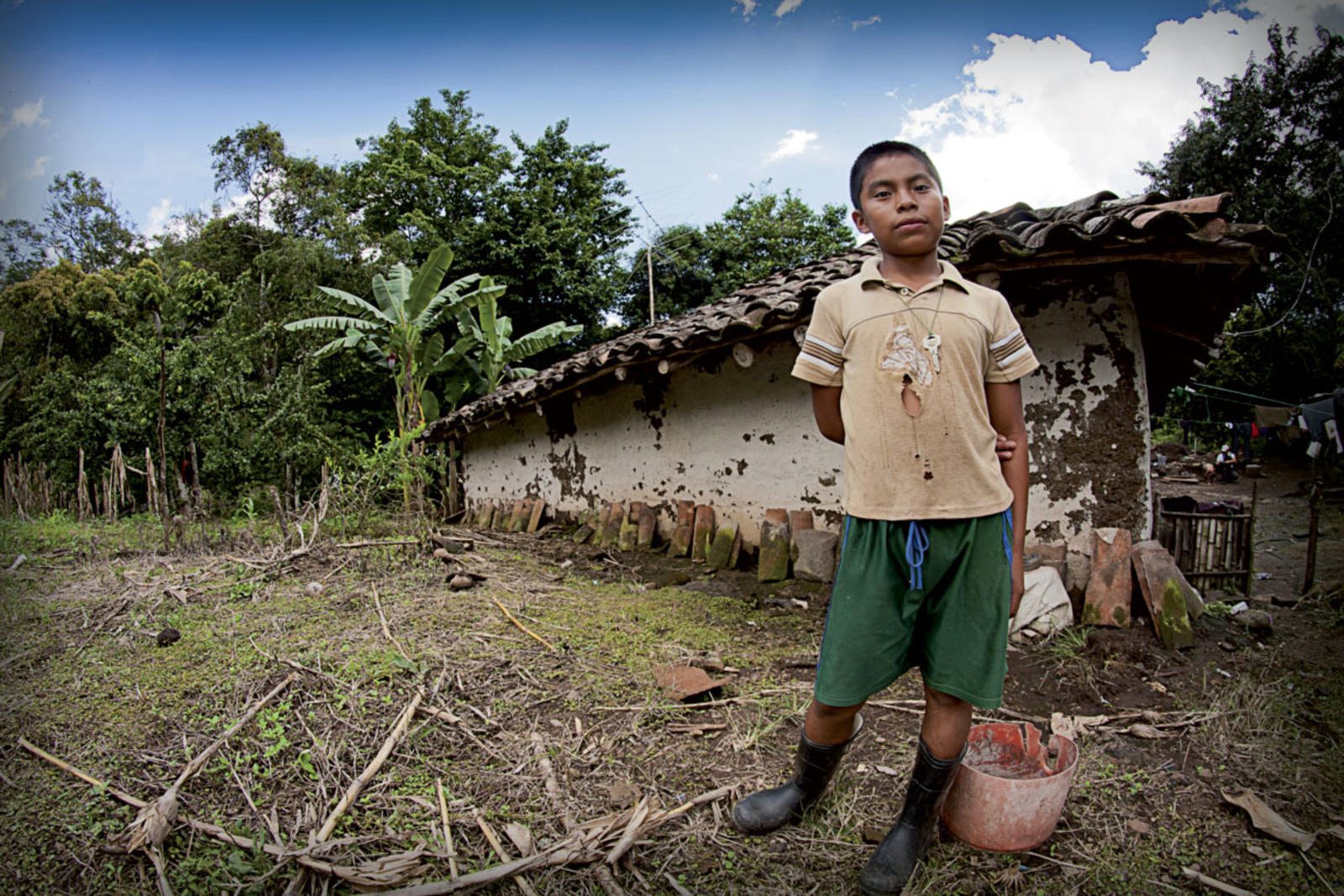
The chapter 2 of this report reflects the work carried out during those workshops and the related questionnaires submitted by the companies. It shows the experiences and challenges from different businesses coming from varying industries, backgrounds and countries to try to understand how businesses are already contributing to the SDGs. For a more in-depth analysis, this report also draws lessons from other publications to support the findings.
Each of the sections included in the report represents key issues worked by the participants. In this sense, each incorporates a variety of perceptions and statements from the various industries to reflect the diversity of the universal agenda and what universality means in practice. This intends to inspire, as different companies may see themselves reflected in the examples, but mostly to facilitate and convey learnings for the private sector and other institutions about how to better contribute to the SDGs. This is what, in the report, is called “universality in practice.”
CONTRIBUTION OF BUSINESSES TO A UNIVERSAL SUSTAINABLE AGENDA
How is this universal agenda relevant to business?
If the push for greater private sector involvement in Sustainable Development is to succeed, it is essential to understand how this agenda is relevant to businesses and why. The majority of the participating companies relate to the SDGs through their sustainability strategies. All have stated that SDGs are potentially applicable to any company, whether public or private, small or large, national or international. However, what is most significant is that all of them agree that their main capabilities to contribute to the SDGs lie in their core business, which represents a key change from previous philanthropic approaches.
Companies are challenged more than ever by the changes in the global economic environment and have realized that sustainable growth will only take place if it incorporates social, environmental and economic impacts to their activities and strategies. Inequality has been increasing around the world, but access to information and the democratic power it contains is now universal. Therefore companies, institutions and, certainly, governments are now held accountable by citizens more than ever before. Knowledge management, the information economy, the incorporation of intangible assets to the valuation of the company, etc., are producing a major change in the business management model, which has extended companies’ visions towards an integrated approach conducive to building sustainable relationships with society.
During the last few decades, companies have been increasingly placing responsible practices and sustainability objectives at the heart of their strategies. For the participants, sustainability has become a main principle of businesses’ corporate strategies. In fact, sustainability in business is becoming an essential component for organizations’ success. By meeting society’s demand for solutions to social problems, sustainability brings to companies a competitive advantage that ensures their long-term viability. Efforts towards sustainability are increasingly considered more as investments than costs. According to a 2016 study15 by Massachusetts Institute of Technology Sloan Management Review (MIT SMR) and The Boston Consulting Group (BCG), based on a 2015 global survey, nearly 90% of surveyed companies consider sustainability strategy essential to remaining competitive. Responses to our questionnaire show that many participants believe the SDGs are able to enhance the competitive advantage of companies, such as helping to streamline and communicate their sustainability efforts to stakeholders.
In a paper for the National Bureau of Economic Research, Robert G. Eccles, Ioannis Ioannou and George Serafe16 researched the differences in performance between companies that had adopted sustainable policies by 1993 and companies that had not. Using data from 180 entities, they found that by 2009, companies that had adopted such policies were more likely to be long-term oriented and more transparent. However, what was most interesting was the realization that those companies greatly outperform their counterparts over long-term periods.
The previous SDG Fund report, Business and the United Nations: Working Together Towards the Sustainable Development Goals, introduced key benefits for institutions and companies working with the SDG Agenda as shown in the box above. These benefits will be highlighted throughout the report by the companies’ experiences.
In acknowledging the importance of the SDGs, workshop participants agree that the lack of commitment to the agenda can impact a business’s reputation and thus its sales as well. Consumers are the last link in the value chain and through their participation they reward, encourage, reject or punish products, brands, formats and other attributes related to the object of consumption based on variables such as reputation, values or ethical, social and environmental considerations. During the last 20 years, companies have witnessed the rise of conscious consumers and have no doubt that engaging in the SDGs is a strategy to promote corporate goals and help their businesses remain in the markets in which they operate. A PricewaterhouseCoopers (PwC) report from 201517 on SDG engagement showed that 90% of
citizens believe it is important that business signs up to the SDGs, and 78% of citizens said they were more likely to buy the goods and services of companies that had done so. But not only consumers are more likely to be impacted by SDG-oriented businesses. According to a MIT SMR report18, 60% of investment firm board members are willing to divest from companies with a poor sustainability footprint.
15 Gregory Unruh, David Kiron, Nina Kruschwitz, Martin Reeves, Holger Rubel, and Alexander Meyer Zum Felde, “Investing for a sustainable future”, (MIT Sloan Management Review, 2016). Available from http://sloanreview.mit.edu/projects/investing-for-a-sustainable-future/
16 Robert G. Eccles, Ioannis Ioannou, and George Serafeim, “The impact of corporate sustainability on organizational processes and performance”, in Management Science, vol. 60, No. 11 (November 2014) p. 2835-2857. Available from http://dx.doi.org/10.1287/mnsc.2014.1984
17 PwC, “Make it your business: Engaging with the Sustainable Development Goals (PwC, 2015). Available from https://www.pwc. com/gx/en/sustainability/SDG/SDG%20Research_FINAL.pdf
18 Gregory Unruh, David Kiron, Nina Kruschwitz, Martin Reeves, Holger Rubel, and Alexander Meyer Zum Felde, “Investing for a sustainable future”, (MIT Sloan Management Review, 2016). Available from http://sloanreview.mit.edu/projects/investing-for-a-sustainable-future/
How are companies adapting these 17 universal goals to their specific context?
The majority of participants stated that the SDGs that are most relevant to them are those related to environmental sustainability (11, 12 and 13) and decent work and inclusive economic growth (8). Many companies are strengthening their internal strategies to ensure that they reduce their environmental impact and improve the quality and conditions of their employees in all countries where they operate, recognizing the importance of human capital and employees` well-being for the company sustained success.
The following sections show some of the key trends in how companies are adapting their businesses and strategies to the SDGs.
Aligning the Corporate Strategy with the Sustainability Agenda
The majority of the workshop’s participants, over 75%, indicated that they are already integrating the sustainability agenda into their corporate strategy through sustainability plans. In most cases, these plans incorporate not only environmental but also social and economic impact goals and indicators.
These results are in line with a 2011 McKinsey report19 that concludes that many companies have been actively integrating sustainability principles into their businesses and have been doing so by pursuing goals that go far beyond earlier concerns for reputation management; for example, saving energy and developing green products. Additionally, the majority of executives interviewed indicated that sustainability programs make a positive contribution to their company’s short- and long-term value, but they also expected operational- and growth-oriented benefits in the areas of cost-cutting and pursuing opportunities in new markets and products.
19 Sheila Bonini and Stephan Gorner, “The business of sustainability”, (California, McKinsey&Company, 2011). Available from http://www.mckinsey.com/business-functions/sustainability-and-resource-productivity/our-insights/the-business-of-sustainability-mckinsey-global-survey-results
Working with company employees: Raising internal awareness
One of the first challenges participating companies found in the appropriation of the SDG Agenda was to understand the SDGs themselves and their possible alignment with their own business strategy. Some companies recognized that incorporating the SDGs into their businesses was an exercise that required internal reflection and time. Only when the company employees are fully aware of the SDGs and knowledgeable of their potential impact, can they work to improve performance and to think more strategically about how to maximize the Agenda’s positive social, environmental and economic contribution.
In this sense, more than half of the workshop participants have identified internal interest groups to raise awareness and engage them in the development and implementation of a strategy involving the SDGs. Participants of the breakout sessions during the Nigerian workshop suggested some actions for companies to raise awareness: in-house training on SDGs, taking into account the communication strategy to accommodate the diversity of languages spoken by the employees, and using an integrated communication strategy with a mix of traditional and social media.
This is in line with a report from The Economist Intelligence Unit20, in which companies’ executives reported including sustainability in a variety of corporate functions like educating employees on sustainability (32%) and engaging employees in sustainability-related activities (30%). Fifty-four percent reported that their sustainability efforts have been led by senior management.
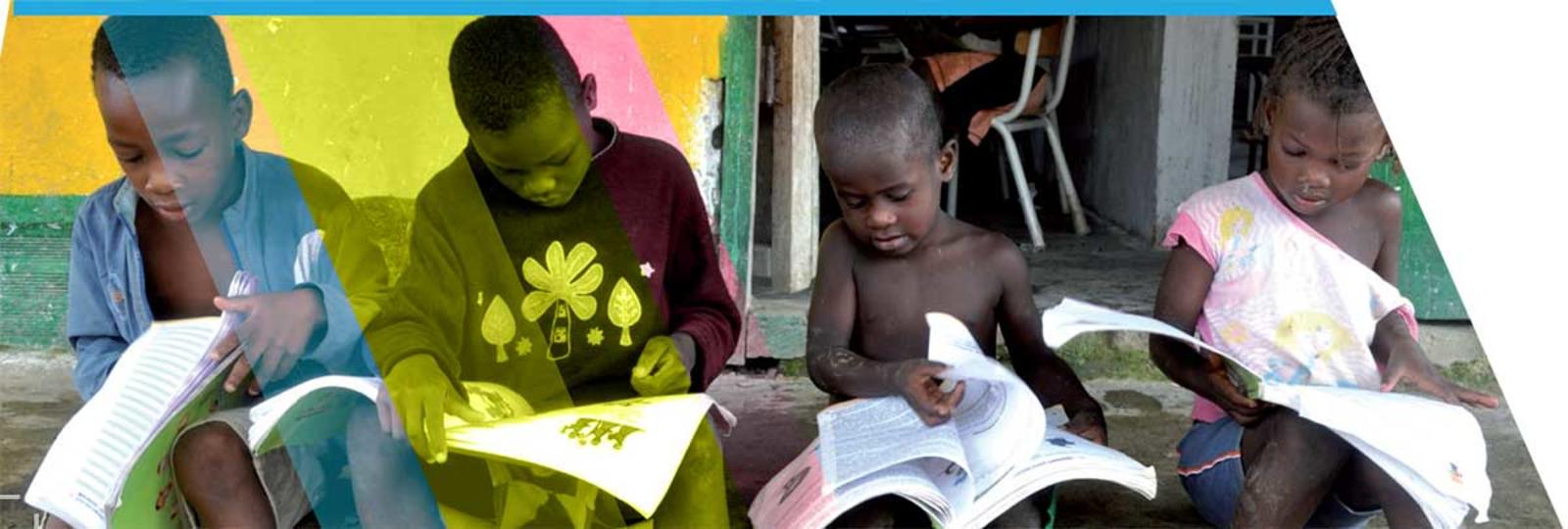
20 The Economist Intelligence Unit, “Managing for Sustainability”, (The Economist, 2010). Available from http://graphics.eiu.com/upload/eb/Enel_Managing_for_sustainability_WEB.pdf
Understanding where companies are: Internal Diagnostic
Over 50% of participating companies have chosen to start their SDG integration by doing an internal diagnostic in order to identify which areas they have greater capabilities in and where their main challenges lie. In this diagnostic process they have also identified which SDGs they can impact through their core businesses.
Institutional support: Legislation and international standards
Lastly, based on the workshops, almost 50% of participants have indicated that they have engaged in the SDG Agenda thanks to either government legislation or international standards and policies that have guided their efforts and transformed their activities into concrete actions and processes.
What challenges are companies facing?
Despite many companies’ early engagement and commitment to integrating the SDGs in their business processes, there are many challenges ahead. Key concerns cited by company participants can be categorized into four major groups: reconciling universality and diversity; defining metrics and indicators; societal awareness and engagement; and forming alliances between governments and the private sector.
Challenges ahead for involving responsible business in SDGs
by Amina J. Mohammed, Minister of Environment, Federal Republic of Nigeria
“Sustainable development cannot be achieved without the active involvement of responsible businesses. The business community has been involved from the beginning in defining the new agenda for sustainable development. Its voice was heard loud and clear. But there are still many challenges ahead:
- First, the challenge of scaling-up.
- Second, we need enabling regulatory frameworks to incentivize and unlock private investments for sustainable development. This is a responsibility of governments and the 2030 Agenda serves as a useful reference for their actions.
- Third, global change must be built from the bottom up.
- Fourth, putting in place mechanisms that will ensure credibility, accountability and transparency.
There is a need for a new generation of young and experienced multi-stakeholder partnerships at all levels, going far beyond the traditional public-private partnerships”.*
* The challenge: How can international co-operation help to put sustainable development at the core of businessmodels? 18 Jul 2016 by Amina J. Mohammed, Minister of Environment, Federal Republic of Nigeria. Available from http://www.undp.org/content/undp/en/home/blog/2016/7/18/The-challenge-How-can-international-co-operation-help-to-put-sustainable-development-at-the-core-of-business-models-.html
Reconciling universality and diversity
One of the greatest challenges to SDG adoption comes from their main advantage: universality. Differences in things such as values, norms, skills, political systems, levels of corruption, legislation, weather or geography across countries and societies can pose context-specific challenges to the implementation of universal goals.
For example, some participating companies from Africa highlighted the challenge of dealing with certain cultural values when implementing the SDG Agenda, especially those related to gender equality. Olam points out that, in addition to poorly regulated competitive environments which make it risky to invest in farmer training and financing, one of the most difficult challenges it faces is promoting women’s empowerment in the face of cultural norms and practices that bar women from owning land, farming cash crops or participating in trainings and meetings. Sahara Group, a Nigeria-based privately owned Power, Energy, Gas and Infrastructure conglomerate, concurs with Olam’s views and considers that some cultural and religious views, such as the prohibition of women to engage in paid employment, land ownership, public speaking or leadership positions constitute major challenges. They also point out that government red tape and corruption are additional factors that can slow down the implementation of sustainability programs.
H&M, a global fashion company, stated that its implementation of the SDGs differs by country, both because local challenges and priorities differ and since local contexts to a specific issue are also different. This implies that different solutions are needed to address the same issues in different countries.
Grupo Nutresa has defined its priorities for sustainable development considering the UN global 2030 agenda, which requires staying ahead in sustainable global practices that ensure competitiveness along their business units and countries. To contribute effectively to this new global agenda, there is a system in place that works on closing the gaps, taking into account the stakeholders` expectations and developing partnership.
Ebro Foods, Iberdrola and Acciona point out that in some contexts, beneficiaries have shown distrust and have been reluctant to view the private sector as an actor of sustainable development. To solve this problem, these companies have strengthened the dialogue with communities to reduce prejudices that civil society has sometimes had against enterprises. Ebro Foods shared its experience with farmers involved in joint projects with the company. It explained that once they get to know the firm, they understood the benefits of collaborating with it and engage in new initiatives very easily. For its part, according to Iberdola’s experience, some beneficiaries who are used to receiving subsidies feel that companies should only act as donors and not contribute as sustainability actors.
So, although the private sector is the main driver for inclusive businesses and sustainable development, its contributions and market-based approaches to development are by no means a panacea. Endeva, an organization dedicated to catalyzing innovative solutions for inclusive businesses, shows evidence in one of its reports21 that government action has often been decisive for the success and growth of innovative inclusive approaches. To achieve the SDGs and overcome the challenges posed by the implementation of a universal agenda in a context of country and societal differences, close cooperation between private and public sectors is needed. In this regard, Pascual, a dairy company, deems it critical that countries reveal their challenges and objectives to achieving the SDGs. If a national plan regarding SDGs is defined, it would be easier for companies to design their sustainability strategies in a way that is both aligned with their corporate objectives and consistent with national public policies.
21 Christina Tewes-Gradl, Anna Peters, Karin Vohla and Lena Lütjens-Schilling, “Inclusive Business Policies”, (Berlin, Endeva, 2013). Available from http://www.enterprise-development.org/wp-content/uploads/end-FoVo-Policy-Sceen.pdf
Setting up concrete goals: Defining metrics and indicators
Once companies have identified their impact on the SDGs many of them encounter serious problems when determining metrics and accountability mechanisms. According to a PwC survey22, just 29% of the companies are setting goals or preparing to set goals aligned with the SDGs that are relevant to their business. Likewise, only 13% of the firms have identified the tools that will help them assess their impact against the SDGs that are relevant to their business. Even in five years, only 30% think they will be using impact assessment tools. Assessing impact is fundamental to valuing the positive and negative contributions businesses make to the SDGs. Without the tools being identified and in use, businesses will struggle to engage effectively.
As it was pointed out during the workshops, large companies have the resources to introduce goals and impact measurement systems related to their sustainability strategy, but MSMEs have many more constraints. In this context, the SDG Agenda has helped to mainstream the sustainability language and facilitated the assessment of the business impact on the new goals.
H&M points out that one of the main challenges ahead in engaging the private sector in the SDGs is finding methods and ways to track and report on the impact of the company’s activities on the SDGs. In this sense, adapting the global KPIs and indicators for each of the SDGs to private sector will be crucial. Based on this, companies may then find methods and ways to assess their impact and guide their work further. Existing reporting standards have a potential role to play here. However, it will also be important that such methods and recommendations leave room for adaption to the varying contexts of different industries, finding a balance between one-size-fits all solutions and adaptation to specific industry characteristics.
BBVA Compass acknowledges that there are some key internal challenges that affect the process of implementing the SDGs, such as the need for indicators that allow for goal-setting and charting progress, the initial time investment required to assess how a company can best contribute to the SDGs and setting in place specific initiatives, and the difficulties of coordinating between different sections of the company or organization to provide a concerted response.
Ferrovial points out that economic and financial value is reflected in the balance sheet and the P&L account, but social value is not reflected at any corporate level. In order to illustrate all value that a company has created in line with the SDGs framework, there is the need to develop a method that enables the measurement and reflection of social impacts as well, taking into account the interest groups with which the company interacts. Therefore, Ferrovial acknowledges the importance of finding the most appropriate methods for measuring the social impact of its actions in order to evaluate the progress made in achieving the SDGs. Along with the SDG Compass, Ferrovial also includes the following among its useful tools: Social Return On Investment (SROI), London Benchmarking Group (LBG) and Impact Model Capacity Index EADA-BEINGS.
22 PwC, “Make it your business: Engaging with the Sustainable Development Goals (PwC, 2015). Available from https://www.pwc. com/gx/en/sustainability/SDG/SDG%20Research_FINAL.pdf
Societal awareness and engagement
The PwC SDG Engagement Survey23 shows that awareness of sustainability among companies is much higher than among citizens. While 92% of companies knew about the SDGs, only 33% of citizens that participated in the study were aware of them.
Workshop participants also acknowledge these citizens’ lack of awareness. Almost 50% recognize that the agenda is still not very well known by the general population. Given this situation, many survey participants have undertaken training and awareness programs within their companies to address this challenge. However, they recognize there is still great work ahead to raise societal awareness.
The participants were surprised that such an important initiative, aimed at finding a stable balance that meets the aspirations of the various stakeholders and allows the achievement of sustainable development, is not better known. They insist that the UN and UN Member Statesincrease advocacy on sustainability issues, working with the media to disseminate the 17 SDGs and their targets.
Additionally, there is a challenge for those companies that do not directly reach consumers. Griffith Foods, a food processing company, points out that companies which do not serve final clients directly face an additional hurdle since it is more complicated for them to get involved with customers. In this sense, sustainability actions pursued by suppliers do not have a big impact on the reputation of the company. Consumers are disconnected from their products and their actions have less visibility. To overcome this challenge, the firm began to reach out to the final consumer and promote its sustainability efforts.
Grupo Nutresa is committed to engaging and spreading the SDGs´ message throughout its value chain, so suppliers, customers and internal public development, will have great relevance in the SDGs adoption.
23 PwC, “Make it your business: Engaging with the Sustainable Development Goals (PwC, 2015). Available from https://www.pwc. com/gx/en/sustainability/SDG/SDG%20Research_FINAL.pdf
Alliances: Governments and the private sector
Barriers and challenges for companies due to market inefficiencies and absence, or constraining regulations, together with the short term vision of many companies, sometimes lead to exacerbated inequalities, corruption and tax evasion24. Some of these obstacles can be overcome by collaboration with development actors. Others call for regulatory oversight or vigilant non-profit watchdogs and an open media.
However, establishing alliances to jointly pursue sustainability goals still remains a great challenge for companies. Over one-third of participating companies consider it essential that governments and institutions keep working to facilitate and generate incentives for partnerships and alliances. Institutional agreements at higher levels are becoming more frequent, but they found it especially challenging to reach implementation agreements at the local level where companies’ activities happen and most of the operational problems take place. Such alliances could contribute greatly to risk management and improving proper accountability.
Based on their experience with the MDGs, participants working in groups during the Nigeria Workshop pointed out a number of issues that prevented stronger and more impactful partnerships between private sector and governments, including: poor and late communication on what the MDGs were and the areas in which the public and private sectors could have worked together; different timelines for activities with respect to MDG implementation; an urgent need in the improvement of the measurement and evaluation of Return on Investment and Impact; and lack of a clearly defined role for the private sector in terms of project funding and implementation.
These companies recommend that areas for action by each sector should be identified, reforms should be evaluated for efficiency and effectiveness, and more forums should be planned to create communication platforms between both sectors.
For example, ANDI found the biggest challenge in the appropriation of the SDGs to be coordination with the public sector and civil society. The association believes partnerships must begin by breaking down barriers and building trust. Each actor must play their part and be the best version of themselves. Alliance members must be self-critical and flexible with partners, and work together as a team to complement each other’s strengths and offset weaknesses.
Moreover, large corporations like Grupo Nutresa can play an important role by committing stakeholders and actors in the value chain to achieve a proactive involvement and build common understandings according to the guidelines and actions that allow effective initiatives that contribute to the SDGs.
24 Jane Nelson, “The private sector and aid effectiveness: Toward new models of engagement” in Brookings, Making development aid more effective, (2010) p. 20-27. Available from https://www. brookings.edu/wp-content/uploads/2016/07/09_development_aid_ nelson.pdf
Overcoming the challenges
Improving development: A framework to learn
The international aid community has realized the challenges and problems of development throughout past years. Their efforts to improve and modernize cooperation and aid implementation have been marked by the High Level Forum for Aid Effectiveness in Rome (2003), Paris (2005), Accra (2008), and Busan (2011). These meetings have emerged from the need to understand why aid was not producing the expected results.
The deliberations and successive forums resulted in the 2011 signing of the “Busan Partnership for Effective Development Cooperation” by more than 100 countries. The agreement highlights a common set of key principles to improve development effectiveness25:
- Ownership of development priorities by developing counties: Countries should define the development model that they wish to implement.
- A focus on results: Having a sustainable impact should be the driving force behind investments and efforts in development policy making.
- Partnerships for development: Development depends on the participation of all actors, and recognizes the diversity and complementarity of their functions.
- Transparency and shared responsibility: Development co-operation must be transparent and accountable to all citizens
In recent years, many scholars and practitioners have worked on new approaches to development cooperation with the aim to improve the mechanisms used by international agencies, donors and other development actors. Professors Andrews, Pritchett and Woolcock of the Center for International Development at Harvard University have developed a framework that focuses on problem solving rather than selling predetermined solutions. That is, it opposes the idea that the primary function of development is the identification of universal solutions - “best practices” - to common problems. Instead, it advocates working in context-specific solutions. The definition of “problem,” of course, varies according to the different interests and perspectives of the actors involved, but the deliberation is in itself a valuable exercise.
According to these professors, development aid has failed in its bid to contribute to building state capabilities, among other factors, because it has focused more on imitating solutions than getting results. To exit this “trap” they have developed a strategy based on numerous cases and theories of leadership and organizational learning from numerous authors – Heifetz, Rodrik and Grindel, among others -- to lead in complex contexts and achieve development results.
The strategy, called Problem-Driven Iterative Adaptation (PDIA), is based on four principles26:
- Local Solutions for Local Problems: Transitioning from promoting solutions (pre-determined by external experts) to allowing the local nomination and articulation of concrete problems to be solved.
- Pushing Problem-Driven Positive Deviance: Creating environments within and across organizations that encourage experimentation and positive deviance, accompanied by enhanced accountability for performance in problem solving.
- Try, Learn, Iterate, Adapt: Promoting active experiential (and experimental) learning with evidence-driven feedback built into regular management and project decision making, in ways that allow for real-time adaptation.
- Scale through Diffusion: Engaging champions across sectors and organizations who ensure reforms are viable, legitimate and relevant.
The following table allows differentiation between traditional and problem-driven approaches27:
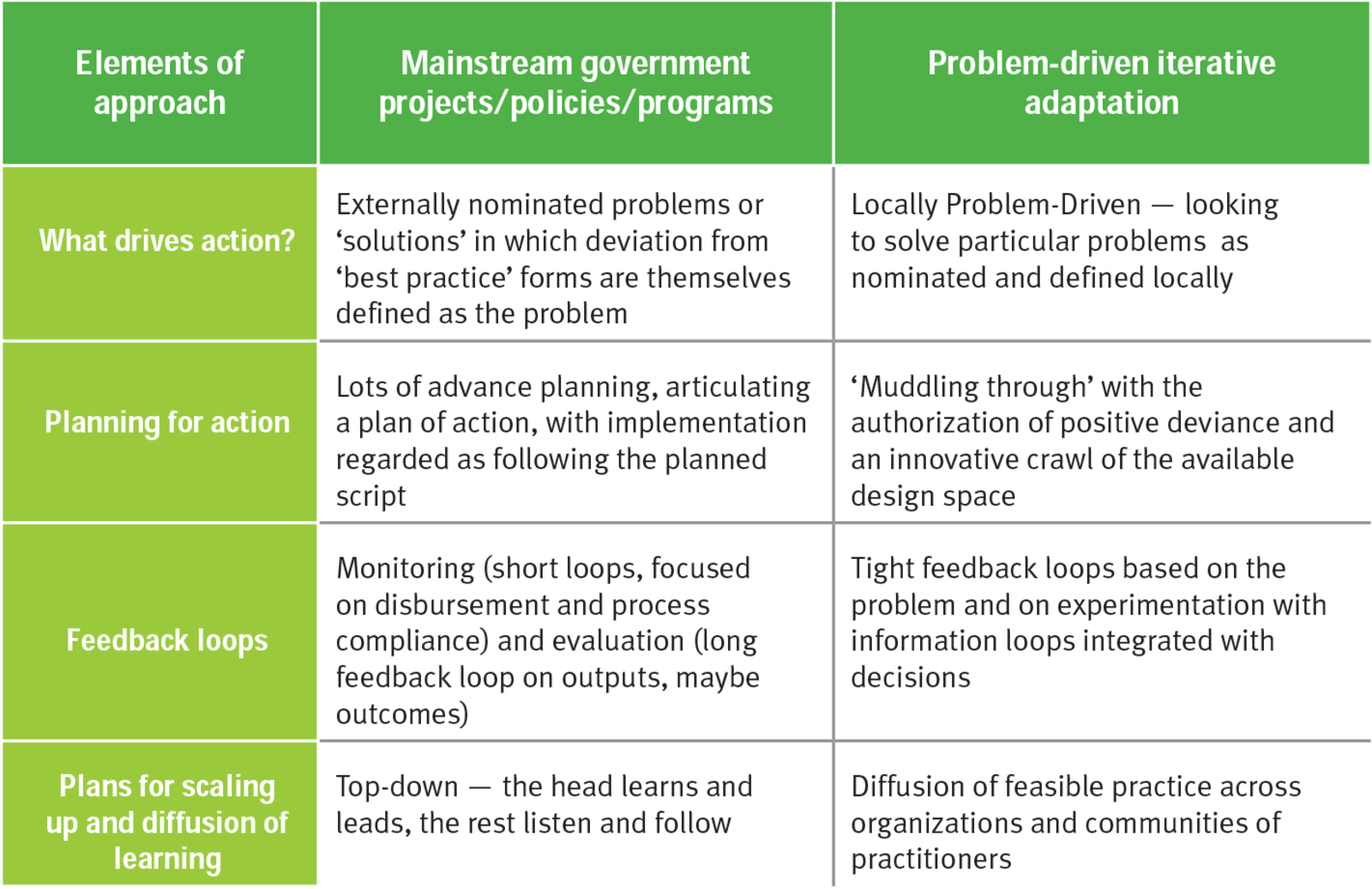
Many institutions –such as the World Bank28 and the professionals’ network Doing Development Different29- have started to incorporate this framework into their working strategies as a way to improve development cooperation and allow for effective organizational learning. Such a framework is presented in this report as a useful tool to analyze companies’ contribution and facilitate learning.
25 Available from http://www.oecd.org/dac/effectiveness/busanpartnership.htm. [Accessed May 2016]
26 Matt Andrews, Lant Prichett and Michael Woolcock, “Escaping capability traps through problem driven iterative adaptation (PDIA)”, in World Development, vol. 51 (November 2013) p. 234-244. Available from http://dx.doi.org/10.1016/j.worlddev.2013.05.011
27 Matt Andrews, Lant Prichett and Michael Woolcock, “Escaping capability traps through problem driven iterative adaptation (PDIA)”, in World Development, vol. 51 (November 2013) p. 234-244. Available from http://dx.doi.org/10.1016/j.worlddev.2013.05.011
28 The World Bank recognizes the importance of enhancing the quality of implementation of development programs. The Global Delivery Initiative (GDI) is an operational manifestation of these ideas. Additional information on the GDI is available from http://www.worldbank.org/reference/GDI/
29 Doing Development Differently is a global initiative designed to facilitate a dynamic conversation about ways to achieve greater development impact. Additional information on the DDD initiative is available from http://doingdevelopmentdifferently.com/
Learning by doing
The workshops and questionnaires allowed each company to exchange experiences and ideas about how they are incorporating or plan to implement the SDGs in their core business activities, operations, industries and different national contexts where each company operates.
This section outlines some companies´ key efforts to overcoming the various challenges. Using the previous framework, the report focuses on how companies have confronted the challenges and how they have reacted to them in order to facilitate and convey learning among participants and other organizations. Specific solutions may change subject to the context and circumstances, but as shown through the research and work of aid institutions, there are some key principles that companies may use to achieve results in their sustainability efforts.
Communicating on SDG performance
Looking for evidence: Tools and strategies
All companies participating in the workshops express their willingness to assess their contribution to the SDG Agenda. Some have already established, in addition to the traditional economic indicators, clear goals related to environmental sustainability and employee working conditions. Interestingly, many companies are already embracing standardized reporting guidelines such as the Global Reporting Initiative Sustainability Reporting Guidelines (G4/GRI). Some others, as mentioned before, are adopting international standards such as ISO 14000, a group of standards related to environmental management, or ISO 26000, which provides guidelines for social responsibility. However, as noted before, identifying the right metric remains a key challenge for companies.
* rsc2 is an innovative tool for measuring the value of Social Responsibility in organizations. It is designed to provide companies executives with a management tool that facilitates the understanding and integration of corporate responsibility into the company strategy. http://www. fundacionseres.org/Paginas/Campus/FichaHerramientas.aspx?IDH=5

Learning to tell the SDG story
All companies agree that the SDGs should be adopted by embracing the concept of “sustainability,” which brings together economic, social and environmental aspects. They insist that the international organizations and governments should advocate more for the achievement of the SDGs, working with the media to disseminate them and their targets.
Most businesses already participate in several sustainable activities, but many have yet to make the link with the SDGs. The Goals enable companies to report information on sustainable development performance using common indicators and a shared set of priorities. The common framework for sustainable development can also be helpful in shaping how to prioritize the reporting narrative and the type of performance disclosure a company makes across a variety of communications on its sustainable development performance.
The KPMG Survey of Corporate Responsibility30 stated that CR (Corporate Responsibility) reporting is now undeniably a mainstream business practice worldwide, undertaken by almost three quarters of the 4,500 companies surveyed. Among them, the Global Reporting Initiative (GRI) remains the most popular voluntary reporting guideline worldwide.
However, during the workshops the discussion did not only revolve around the use of SDGs as metrics or references to communicate progress on corporate sustainability, rather it was focused on how the communication of initiatives and activities is in itself a tool for the dissemination of sustainable practices. It was noted that companies, together with institutions, have to learn to better tell their stories with the SDGs and sustainable development.
30 Adrian King and Wim Bartels, “The KPMG Survey of Corporate Responsibility Reporting 2015” (Amsterdam, KPMG International Cooperative, 2015). Available from https://www.kpmg.com/CN/en/IssuesAndInsights/ArticlesPublications/Documents/kpmg-survey-of-corporate-responsibility-reporting-2015-O-201511.pdf
CASE STUDIES
The following case studies give some insight into ten PSAG member companies and spotlight projects they have been working on, emphasizing how the SDGs can be incorporated into a company’s core business activity, the crucial importance of establishing diverse partnerships to bring about sustainable and targeted change, as well as the business opportunities these sustainable development projects can create.


3.1. Grupo Nutresa
Grupo Nutresa is a food processing company with a long-standing commitment to sustainability, having been listed in the Dow Jones Sustainability Index for six consecutive years. They are based in Colombia and are considered a key player in the Latin American market, with 45 production plants, 45,000 employees and more than one million clients.
They consider sustainable development as their overriding management framework, with the aim of ensuring their economic model goes hand-in-hand with social development that benefits their various stakeholders and in harmony with the environment In 2014, Grupo Nutresa identified six strategic priorities in sustainability and has backed this up both through involvement in collaborative development projects and through its core business practices. With a direct presence in 14 countries, Grupo Nutresa has put in place numerous initiatives to reduce the environmental impact of its plants, work with local farmers and suppliers, and provide business opportunities targeted at women and small vendors.
Case study: Improving coffee processing

In 2013, Grupo Nutresa launched a four year project to work with small farmers on improving coffee processing practices. Based on the realization that small farmers did not have enough income to invest in improvements to their farms and equipment, Nutresa partnered with a coffee growers’ cooperative to improve infrastructure for coffee processing.
Eligible members were provided with assistance in the form of materials destined for specific, time-constrained projects on their farms. It was found that once initial assistance was provided, many beneficiaries were able to continue to develop projects beyond the initial scope thanks to the help provided by the cooperative.
Of the 1,540 cooperative members, 1,135 were beneficiaries of this program, including all 26 female members.
The project allowed for better coffee processing, while also improving the lifestyle and skills of local suppliers. It proved to be a mutually beneficial partnership which has been helping to support sustainable development while supporting Nutresa’s core business practice.
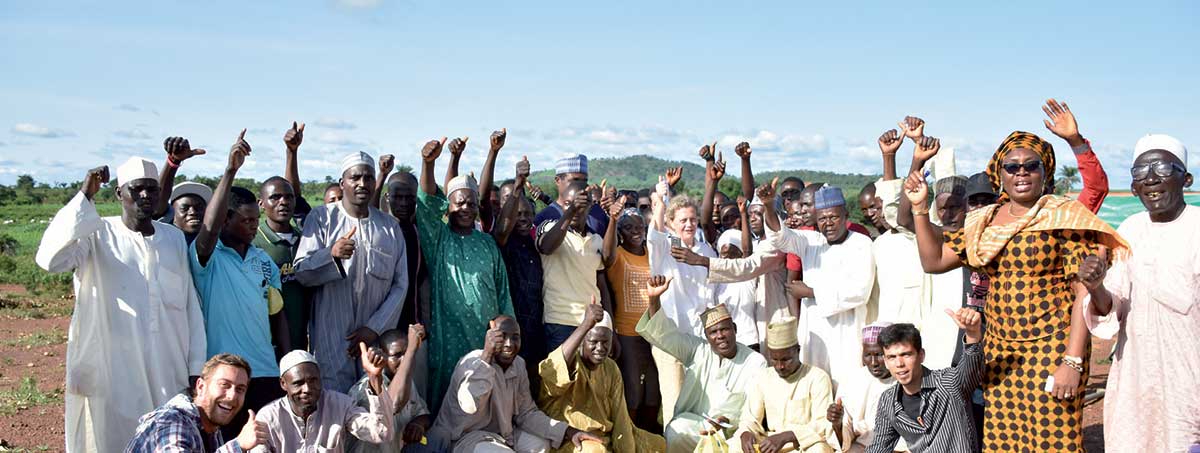

3.2. Sahara Group
The Sahara Group is a Nigerian conglomerate with long-standing experience in the oil and gas sector, and more recently in the wider energy and infrastructure sector. It is made up of 20 operating companies and currently maintains offices and operations on four continents.
With the publishing of its first sustainability report in 2014, the Sahara Group reaffirms its commitment to accountability and sustainability and is working to more closely align its numerous CSR initiatives with the SDGs. It sees these initiatives and its wider work towards attaining the SDGs as a “business safety net and trampoline for our core business and the society at large”.
In accordance with their commitment to productive partnerships with local communities and reducing the impact of their activities on the environment, the Sahara Group established the Sahara Foundation which in 2015 alone had over 50,000 direct beneficiaries.
In the words of Babatomiwa Adesida, manager of the Sahara Foundation:
Case study: Light Up Nigeria Challenge

The Sahara Group, in conjunction with ENACTUS Nigeria, hosts a yearly event to encourage innovation in alternative and renewable energy resources. The competition brings together students from tertiary education institutions from around the country who present projects showcasing alternative energy sources and innovations to help ensure sustainable electricity supply in Nigeria.
The 2015 competition, which attracted entries from 28 different schools, involved developing simple models to reduce energy production costs and encourage the use of alternative energy sources in communities, small businesses and schools. The winning group then had the opportunity to present their ideas in front of a global audience in South Africa.
This competition provides a national and international platform for young people to present their ideas and empowers them to make real change in their communities. It also serves to power innovation in the energy sector where the Sahara Group conducts most of its business, helping develop more efficient and environmentally-friendly solutions while contributing to sustainability.


3.3. BBVA Microfinance Foundation
The BBVA Microfinance Foundation is a non-profit entity, created by BBVA Group in 2007 with the mission of promoting the economic and social development of vulnerable people, through financial inclusion. The Foundation has two main lines of activity:
First, the consolidation of its group of microfinance institutions in Latin America. With nearly 8,000 employees and more than 500 branch offices throughout Latin America and the Caribbean it is providing Responsible Productive Finance to 1.8 million vulnerable people. It has disbursed more than USD 8.1 billion in productive loans to low-income entrepreneurs since its establishment.
Second, the BBVA Microfinance Foundation actively works on the development of the microfinance sector through good corporate governance, human capital training, promoting appropriate regulations and social impact measurement.
Case study: Responsible Productive Finance

“Responsible Productive Finance” is the methodology of the Foundation, where financial services, as well as accompaniment are provided to support its clients´ economic activity, pursuing their sustainable development. The aim of this model is that clients and their economic activities become successful, not only through financial services (credit, savings, insurance, remittances…), but also through comprehensive and continuous support, enhancing their business abilities and financial literacy.
“Savings for All”, a program in Peru for vulnerable groups in rural high Andes areas implemented through its microfinance institution (Financiera Confianza) is an example of Responsible Productive Finance. It seeks to improve the living conditions of the least advantaged rural populations by means of financial education in their indigenous language (Quechua) using puppets and a programmed savings product designed with their needs in mind. In two years of operations, the program has taken financial education to over 13,650 people in 52 rural communities in the Apurímac and Cusco regions. Of the people receiving training, 23% valued the security provided by the formal financial system when they decided to open a savings account, with 80% of those being women. Clients define their savings aims when they open their account: most were saving for the primary purpose of paying for their children’s education, viewing this decision as the opportunity for the latter to achieve a better standard of living. This program and its findings showed that financial inclusion play a critically important role in reducing poverty.
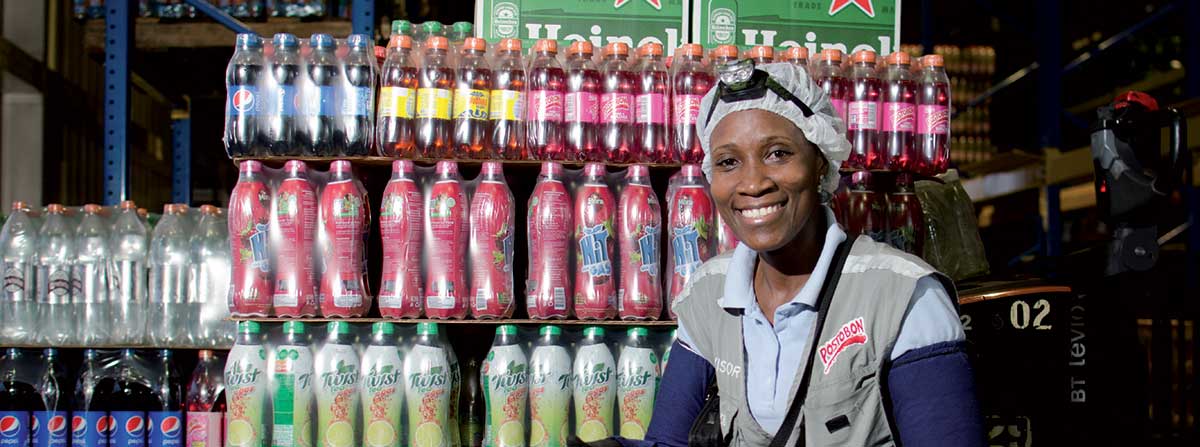

3.4. Organización Ardila Lülle
Organización Ardila Lülle is a leading Colombian conglomerate, involved in sectors as diverse as media and communications, agro-industry, insurance, beverages and the automotive sector. The company has a long-standing commitment to sustainability and corporate social responsibility with a particular focus on developing human capital, creating a sustainable value chain and minimizing environmental impact.
In recent years, the company’s sustainability initiatives have been reorganized in a more systematic way so as to make better use of opportunities that contribute to core business, identifying opportunities for creating competitive advantages or mitigating industry-related risks. Postobón, a member of the conglomerate and the largest non-alcoholic beverage company in Colombia, boasts a sustainability model called Uno más Todos which aims at co-partnership in order to bring about significant and effective change.
Organización Ardila Lülle believes that the SDGs provide a useful platform for private sector initiatives in terms of sustainability and development, as they provide a unified language which allows for better understanding and cooperation both within the private sector and with other actors.
Case study: Micro-franchising

In 2015, Postobón became the only private sector partner in a micro-franchising initiative headed by Propaís, a Colombian entity that helps facilitate cooperation between the government and the private sector, and the Inter-American Development Bank.
The program helps small businesses with large potential to become a microfranchise, expanding their reach and profitability. At the same time, the program also provides training sessions to potential low income entrepreneurs so that they can purchase one of those franchises and thus start a business without many of the associated risks.
The project has involved significant outreach to raise awareness among potential partner companies as well as training programs for both consultants and new franchisees in order to ensure the long-term success and sustainability of the initiative.
Postobón found itself uniquely positioned to make a significant contribution to the project due to its business expertise and long-standing involvement with local suppliers and companies that could benefit from this micro-franchising scheme.
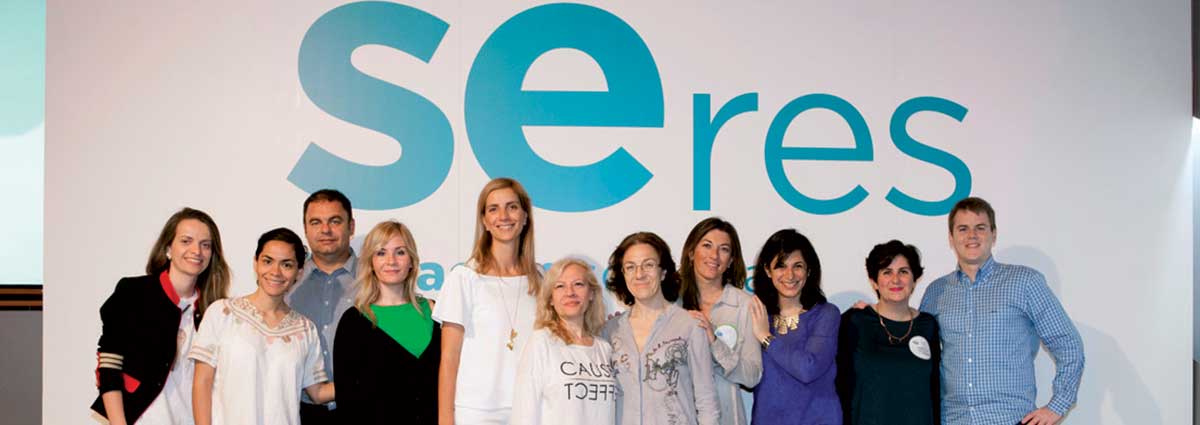

3.5. Fundación SERES
Established in 2009, Fundación SERES is an entirely privately-funded institution whose mission is to promote corporate commitment to societal improvement in line with their business strategy and while generating value for all stakeholders involved. It is a non-profit body that brings together 129 of the largest companies based in Spain to address social needs and promote shared value models and changes in corporate culture.
In their view, a key value of the SDGs is their universality, which provides a common language and shared framework for coordinating the sustainability and development efforts of all the companies they work with.
the SDGs which is to promote the transformation of the business reality to create better societies. Moreover, the SDGs are the universal language and vehicle that can facilitate the path to achieve
these goals.”
SERES shares the SDG Fund’s mission to raise awareness of the SDGs. The Foundation helps communicate the importance of companies adopting the SDGs through events, workshops and the publication of numerous reports. It is specially important their work with senior management, where they engage and work with major challenges with relation to social value creation.
They believe that companies who do not adopt these ideas regarding sustainable development are missing the opportunity to expand their business, reach new markets and innovate.
Case study: Annual Compartiendo event and Informe del impacto social de las empresas

In 2016, Fundación SERES held its fourth annual Compartiendo (Sharing, in English) business conference. Past iterations have focused on sharing solutions, sharing challenges and sharing opportunities. This year the conference focused on sharing new models and had as its key focus the presentation of an innovative social model by Action Tank.
By bringing together representatives from various companies associated with SERES as well as groundbreaking speakers such as Action Tank for discussions, roundtables and presentations, SERES works to improve knowledge and build awareness throughout the private sector of different and effective ways to engage with ideas of development and social change. They also act as a valuable platform for sharing experiences and best practices. In this way, Fundación SERES are helping make the SDGs a widespread and everyday part of business strategy.
Moreover SERES along with Deloitte annually publish a report Informe del impacto social de las empresas (Social impact of enterprises, in English) to show the aggregated impact of the actions carried out by companies. This report aims to communicate the work that they do and show how they positively generate value for the society. This report also encourages many other companies that have not yet participated to measure their activities in social action, report them and communicate them.


3.6. Ebro Foods
The Ebro Group is a leading company in the food processing sector. Originally established in Spain, it now has a presence in more than 52 countries on four continents, is the world leader in the rice sector and second largest pasta manufacturer worldwide.
As a company involved in the agricultural sector, Ebro Foods understands the vested interest it has in promoting sustainable development and encouraging both the efficient use of resources and innovation in the sector. As a result, sustainability is built into every aspect of the company.
Ebro encourages transparency, compliance with good governance and a commitment to consumers, employees and the responsible management of resources. Ensuring a sustainable business model is enshrined as one of the four policy objectives of its Corporate Social Responsibility policy.
In 1998, the company established the Ebro Foundation as the driving force behind its social and sustainable agriculture action. The Foundation is involved in solidarity actions, cooperation programmes and projects which contribute to the socioeconomic development of the geographical regions in which the company operates.
Case study: Food security among small farmers in Viet Nam

In the province of Phu Tho, Viet Nam, 84% of the population is involved in rice growing and depends on this crop for nourishment, and 30% of the population are living in poverty. As part of its work through the Ebro Foundation, Ebro Foods and Fundación CODESPA, a Spanish NGO that works to help people escape poverty through employment opportunities, launched a project in 2014 to improve food security among rice farmers in this province.
The aim of the project was to improve agricultural practices and processes in order to improve yields, helping to reduce the frequent food shortages that affect this area and allowing farmers to increase their income by producing surplus crops. This was achieved through innovation in the use of fertilizers. A new pellet-form fertilizer allowed for a slower release of nutrients in the soil and was less likely to be depleted through evaporation and leaching than the traditional surface fertilizers.
This change led to improved crop yields of between 13% and 25%, depending on the area, and increased farmers’ income by 18% to 40%. So far over 60,000 households are benefitting from the use of this new fertilizing system, which is sold at an affordable price and has reduced contamination by 90%.
In a show of its continued commitment, in 2016 Ebro Foods joined the Sustainable Rice Platform (SRP), a multi-stakeholder association co-created by UNEP and the International Rice Research Institute to ensure sustainability all along the rice value chain. Also, in 2015, Ebro Foods joined the SAI platform, the primary global food & drink value chain initiative for sustainable agriculture, that facilitates sharing, at precompetitive level, of knowledge and best practices to support the development and implementation of sustainable agriculture practices, and created with several other members a specific working group for rice.
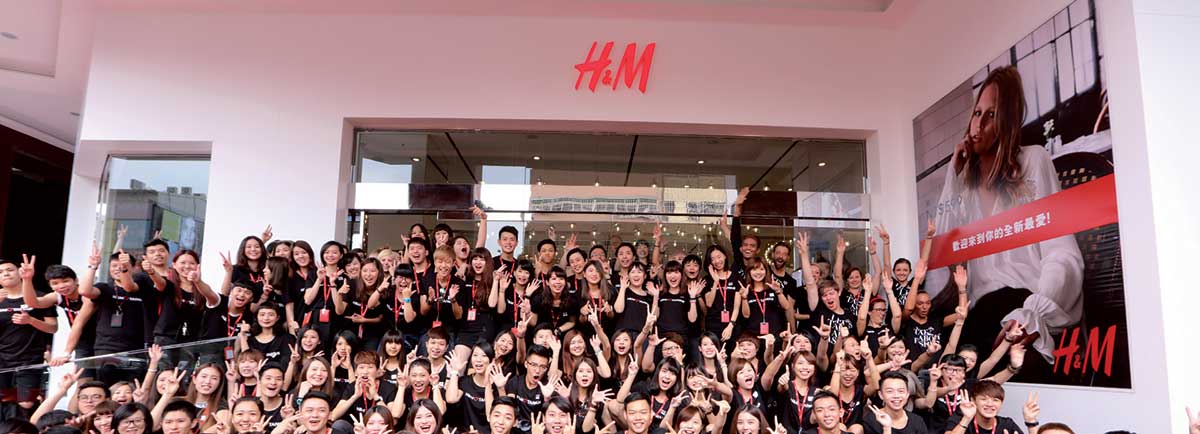

3.7. H&M
H&M is a global fashion company based in Sweden which currently comprises of six distinct fashion brands and more than 4,100 stores in 64 markets. Their stated aim is to make sustainable, good-quality fashion accessible and affordable and use their scale to help drive systemic change making the fashion industry economically, socially and environmentally sustainable.
The company recognizes that incorporating sustainable development into their business strategy is of paramount importance, as they help ensure the longevity of their business and improve the lives of those whose work is directly or indirectly related to their activities. H&M’s approach relies on a broad global vision and integration of the sustainability programs in all business funcions programs. Theseare then tailored to each specific context, designing programs and initiatives in collaboration with relevant partners in order to ensure the effectiveness and sustainability of their projects.
A key appeal of the SDGs is the broad consensus and global commitment they represent and the way they encourage an inclusive and collaborative approach to development.
They recognise that the SDGs are very much in line with their existing priorities and provide a good framework when designing the business’ strategy going forward and in finding new and innovative collaborations.
Case study: Industrial Relations in Ethiopia

As part of a partnership agreement signed in 2014 by H&M and the International Labor Organization (ILO), H&M, ILO and the Swedish International Development Cooperation Agency (Sida) have launched a program in Ethiopia aimed at improving industrial relations and social dialogue in the garment manufacturing sector where H&M’s suppliers operate. The project, co-financed by H&M and SIDA, is being implemented by ILO in collaboration with the Ethiopian government, the Confederation of Ethiopian Trade Unions and the Ethiopian Employers Federation, demonstrating the potential for multi-partner development projects that include UN agencies, governments, companies and civil society.
The project is assisting the relevant local and industry stakeholders in their efforts to promote social dialogue and improve productivity as well as improve wages and working conditions through nurturing sound labour relations practices and promoting collective bargaining. This will not only contribute to creating a socially sustainable textile and garment industry in Ethiopia, but also create the necessary conditions for improving the quality of goods, increasing productivity, job satisfaction and overall social and economic development.
Within their Industrial Relations and Social Dialogue Program and in addition to their work with ILO and Sida in Ethiopia, Cambodia and Myanmar, H&M is also running industrial relations projects in factories in Bangladesh, India and China which include a significant training aspect, for instance educating workers on how to establish democratic elections for representatives and the creation of effective social dialogue between workers and employers. Based on their shared belief in the benefits and importance of a well-functioning social dialogue, H&M has also partnered with the trade unions IndustriALL Global Union and IF Metall through a Global Framework Agreement and are also a partner of the Global Deal initiative developed by the Swedish Prime Minister in cooperation with ILO and OECD launched in 2016.
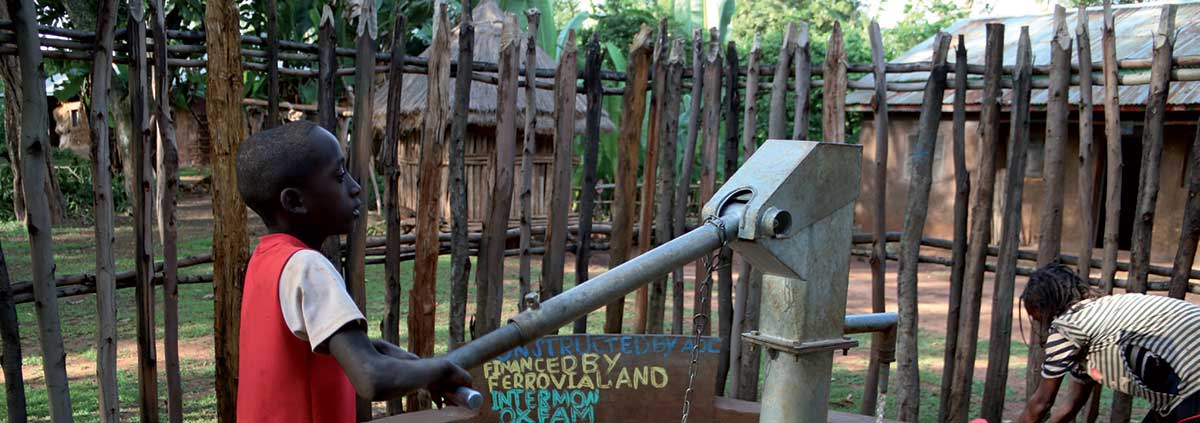

3.8. Ferrovial
Ferrovial is one of the world’s leading infrastructure operators and municipal services companies, committed to developing sustainable solutions. Working in the areas of Services, Toll Roads, Construction and Airports, Ferrovial feels that the private sector can make a significant contribution to development and sustainability through its core business activities.
With a presence in over 14 countries, Ferrovial understands the wide-ranging impact their actions can have, and feels that companies who do not incorporate sustainability and development into their day-to-day activities will lag behind and lower both their reputations and their chances of accessing new business opportunities.
Ferrovial is currently working to adapt their Corporate Responsibility Strategic Plan (Plan 2016) to better reflect the SDGs and has been included in the Dow Jones Sustainability Index (DJSI) for the fifteenth consecutive year; one of only three companies in the Construction and Engineering sector featured this year.
The company is involved in development projects around the world and wants to go beyond simple investing: “Ferrovial wants to be an industry partner of the New Agenda and not merely a financial ally, playing a key role in the achievement of the SDGs.”
Case study: Carrera 80

In 2013, Ferrovial Agroman was granted a contract to begin expansion and upgrade work on the Carrera 80, which connects the city of Medellín in southwestern Colombia with the Pacific ports. Beyond being concerned with the construction of key infrastructure, Ferrovial ensured that this project contributed to sustainable development by building partnerships with local authorities and communities and by approaching challenges in accordance with the SDGs.
The project site was in one of the poorest areas of Medellín and preliminary reports identified numerous challenges facing locals, including poorly-constructed housing and improper waste management. Ferrovial, in partnership with the Medellin City Council and ISVIMED (the Medellin Social and Housing Institute) worked to resettle families and evaluate the structural impact of the project on nearby constructions following completion of the roadworks.
It was necessary to involve the community if the project was to be successful; people had to see it as an opportunity for boosting growth and social development in the area. Through this project, professional opportunities were created for local residents, totaling 750 direct and 500 indirect jobs, incorporating and increasing financial resources into the community. Local involvement and input was ensured through constant communication with local committees and their leaders, including a large number of women.
As a result, access to homes has been improved, several further infrastructure projects are underway and local communities have been able to establish new partnerships with other regional stakeholders.
This project is a clear example of how companies can incorporate SDGs into their core business, as Ferrovial put measures in place to encourage sustainable, positive impacts in consultation with the local community as part of its commercial ventures.
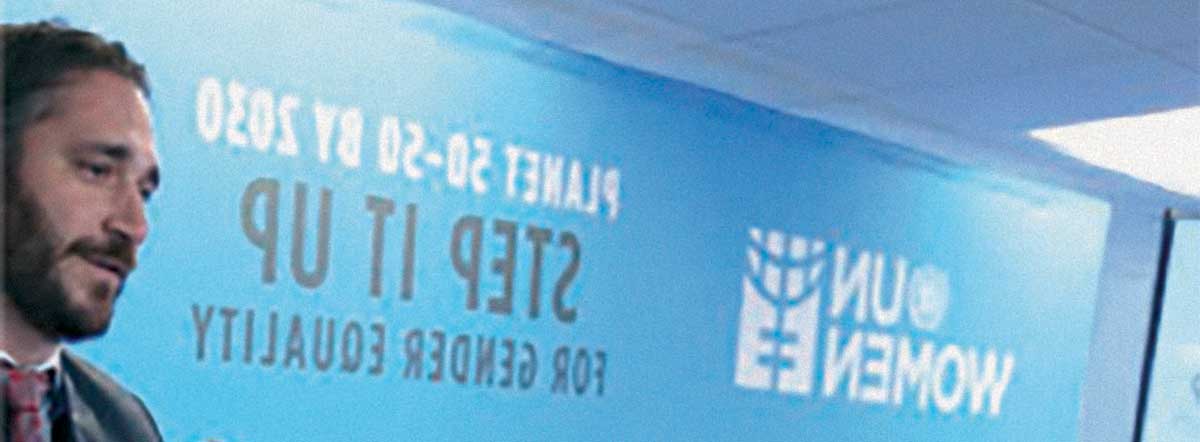

3.9. PVBLIC Foundation
The PVBLIC Foundation is a non-profit organization committed to using media and new technologies to drive social change. They partner with non-profit groups and social impact campaigns with limited budgets and use their experience to create a media strategy that will increase issue awareness and effectively reach the target audience.
PVBLIC pairs with a variety of partners at the local, national and global levels, from creative agencies to government agencies or documentary filmmakers, all with the aim of raising awareness on a mass scale.
As key partners of the SDG Fund, PVBLIC believes that the media, and in particular social media, will be crucial in raising awareness and organizing concerted efforts to help achieve the SDGs by 2030.
Case study: YouthSpeak Survey

In 2015, PVBLIC Foundation partnered with AIESEC to launch the second YouthSpeak Survey. This survey aimed to find ways of engaging millennials by determining how aware they are of the SDGs, what they care about, how they would like to be involved in the implementation of the SDGs and how young people can be empowered to take meaningful action.
The survey eventually collected responses from 160,292 young people worldwide, finding that nearly half were already aware of the SDGs. Other insights involved what factors are most important to young people and where they turn to for information; namely online social media platforms and television, showing the importance that media will play in informing and engaging younger generations.
AIESEC is the world’s largest youth-led organization and seeks to provide young people with opportunities to undertake experiences that have a positive impact on the world while developing valuable skills. By partnering with PVBLIC they were able to combine a global network of young people with media sector expertise to help raise awareness about the SDGs and find new ways of contributing to their implementation in meaningful ways.
The momentum of this YouthSpeak survey has led to other initiatives, such as AIESEC’s Thunderclap project, described as “the first-ever crowd-speaking platform,” helping create visibility for an issue on social media by coordinating efforts and having large numbers of people share the same message at the same time.


3.10. SABMiller
SABMiller is a multinational brewing and beverage company with a presence in more than 80 countries and over 70,000 employees. They are committed to their work in sustainable development and wish to do business in a way that improves livelihoods and builds communities.
The company has made vast strides in implementing the SDGs as part of its business strategy. SABMiller’s sustainable development strategy and sustainable development reports specifically use the SDGs as a framework for outlining the work and progress they have made. Furthermore, they understand the importance of moving beyond philanthropy to a business model that fully integrates ideas of sustainable development- an attitude that is demonstrated through a sustainable development strategy based on “five shared imperatives,” acknowledging the need to work with local communities, suppliers, governments and consumers to tackle joint risks and create mutual benefits.
The company sees the SDGs as a valuable tool for businesses, creating a framework for collaboration and a way of connecting sustainability efforts with the creation of business value. In an effort to facilitate the application of the SDGs to all businesses, SABMiller, in partnership with Earth Security Group, has created an SDG business impact tool which acts as a lens through which potential avenues for engagement with sustainable development within core business activities can be understood.
Case study: Precision Irrigation of Barley (PIB)

As part of its “a resilient world” imperative, SABMiller has launched a number of initiatives aimed at achieving a more efficient use of water. This is based not only on a commitment to environmental sustainability, but the reality that water is an essential part of the brewing process and therefore essential to SABMiller’s continued productivity.
Notable among these is SAB’s Maltings precision irrigation of barley (PIB) project in South Africa. The barley used by the company is grown in an arid region of South Africa’s North Cape, where it competes for limited water resources with the mining sector, other agriculture and domestic consumption.
Maltings partnered with the University of the Free State and volunteer farmers to develop a system that would reduce the amount of water used for irrigation. According to internal studies, in 2009 SAB Ltd.’s water footprint in South Africa stood at 155 liters of water per liter of beer, 84% of which corresponded to irrigation.
The two-year programme required volunteer farmers to experiment with new irrigation techniques, which involved specific amounts of water being used at each growth stage of the barley. By collecting extensive data, SABMiller was able to create a personalized irrigation recommendation chart for each farm, to be used in conjunction with advice from external consultants. A partnership with the University of the Free State in the second year allowed for continued evaluation of the results and more intensive barley-growing trials.
By the end of the program participation had increased from three farms to thirteen, and water usage had been cut in half.
TOOLS FOR BUSINESSES
The UN Global Compact (UNGC) has developed a number of tools which can help businesses eager to integrate the Sustainable Development Goals into their day-to-day activities. These tools can help overcome common challenges such as finding the most productive ways of incorporating the SDGs into core business activities, adapting the Goals to specific contexts and businesses, measuring progress and impact, and building productive partnerships based on a common commitment to the Sustainable Development Agenda to better enjoy the benefits of this engagement.
The UN Global Compact and the SDG Compass: Aligning business strategies with the SDGs
The United Nations Global Compact is a call to companies everywhere to align their operations and strategies with ten universally accepted principles in the areas of human rights, labour, environment and anti-corruption, and to take action in support of UN goals and issues embodied in the Sustainable Development Goals. The UN Global Compact is a leadership platform for the development, implementation and disclosure of responsible corporate practices. Launched in 2000, it is the largest corporate sustainability initiative in the world, with more than 9,000 companies and 4,000 non-business signatories based in over 160 countries, and more than 80 Local Networks.
The UN Global Compact is a voluntary initiative that brings together diverse businesses “to advance United Nations values and responsible business practices within the United Nations System and among the global business community”1. UN Global Compact aims to mainstream sustainable business engagement, based on the belief that deep, systemic transformations, such as that called for by the SDGs, will not be achieved without the full engagement of the private sector and a widespread commitment to sustainable business.
Through a Making Global Goals Local Business campaign, the UN Global Compact works to raise awareness of the SDGs among businesses around the world. To move from awareness to action, the UN Global Compact offers participants an extensive toolbox including next-generation solutions platforms, an online UN Business Action Hub at business.un.org and resources, such as the SDG Compass, the SDG Industry Matrix and tools focused a range of specific issues aligned with the SDGs.
The SDG Compass was developed with a focus on large, multinational enterprises, however small and medium enterprises (SMEs) and other organizations are also encouraged to use it, adapting as necessary. It is designed for use at entity level, but may also be applied at product, site, divisional or regional level as required.
The SDG Compass Guide is organized into sections that address each of the five steps:
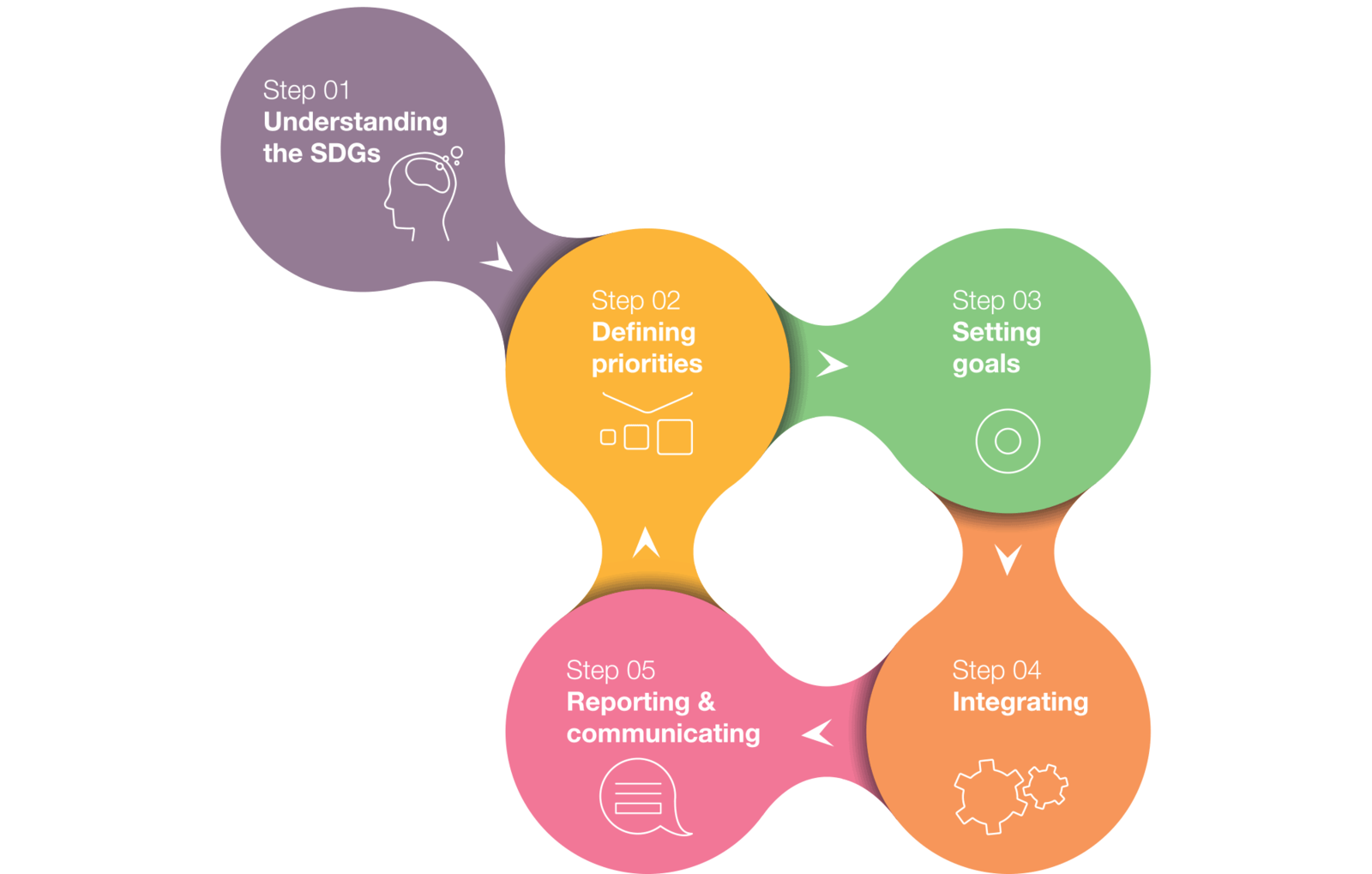

Understanding the SDGs

Defining priorities

Setting goals

Integrating

Reporting and communicating
Companies can use the SDGs as an overarching framework to shape, steer, communicate and report their strategies, goals and activities, allowing them to capitalize on a range of benefits such as:
- Identifying future business opportunities: The SDGs aim to redirect global public and private investment flows towards engaging with global challenges. In doing so they define growing markets for companies that can deliver innovative solutions and transformative change.
- Enhancing the value of corporate sustainability: Whilst the business case for corporate sustainability is already well-established, the SDGs may, for example, strengthen the economic incentives for companies to use resources more efficiently, or to switch to more sustainable alternatives.
- Strengthening stakeholder relations and keeping the pace with policy developments: The SDGs reflect stakeholder expectations as well as future policy directions at the international, national and regional levels. Companies that align their priorities with the SDGs can strengthen engagement of customers, employees and other stakeholders, and those that do not will be exposed to growing legal and reputational risks.
In this sense, beyond materiality considerations, companies that align their strategies and goals with the SDGs will have the incentive and know-how to optimize their investment in CSR and development projects. By committing to these universal goals and aligning their strategies with the SDG Agenda in a way that responds to the specific context in which they operate, companies will be in the best position to create trust and engage in principle-based partnerships with other public and private stakeholders.
The individual commitment of a company through participation in local organizations or thematic platforms can scale the value of their engagement, granting access to national, regional and relational networks linked by a universally-acknowledged Agenda, including a common language and shared purpose. The SDGs define a common framework of action and language that will help companies communicate more consistently and effectively with stakeholders about their impact and performance. The goals will help bring together synergistic partners to address the world’s most urgent societal challenges.
1 A/RES/70/224
Local Dimensions of the Global Agenda: Local Networks
As part of their aim to engage with global issues on a local scale, the UN Global Compact has also developed what they call Local Networks. These are independent, self-governed, self-managed entities that work with Global Compact to help companies understand what responsible business and engagement in sustainable development means in their specific national, cultural and lingual context. They facilitate outreach, policy dialogue and education through seminars, issue-specific workshops and consultation and by providing a platform for networking and collaboration between businesses and varied stakeholders, including NGOs, governments and academia.
Much like the workshops run by the SDG Fund, these kinds of networks can help businesses identify sustainability challenges, opportunities and share experiences and best practice. In this way they can lead to a better engagement with the Sustainable Development Agenda and help provide the support needed for more companies to begin working towards these targets.
Currently present in approximately 80 countries, these local networks provide a good opportunity for businesses to engage with the SDGs and also for the private sector to become more involved in the wider conversation. Among its potential contributions, Local Networks can:
- Provide a business perspective within wider dialogues relating to national priorities and SDG action plans.
- Facilitate partnerships and collective action for the implementation of the SDGs.
- Promote accountability measures and reporting procedures to track progress made towards implementing the SDGs.
Local Networks aim to have a specific impact on SDG implementation through their SDG Action Plans. These will help translate the global agenda to the local level, identify all relevant local stakeholders, map out key areas of opportunity and coordinate business engagement. These action plans promote and facilitate private sector involvement by:
- Helping to mainstream business goal—and strategy—alignment with the SDGs through training and the dissemination of reference documents and tools such as the SDG Compass.
- Contributing to the establishment of a public-private multi-stakeholder policy space for businesses to engage with the challenge of advancing the SDGs at the local level. Dialogue can be oriented to reinforce and complement public policies for the advancement of national SDG action plans.
- The Local Networks will bring together diverse entities to combine business experience with institutional insight, national policy-making and innovative research. Local Networks must be as inclusive as possible in order to broaden and enrich policy dialogues and create new and diverse partnerships. By creating a unified dialogue and policy-making process, these networks can help ensure a common strategic approach, greater accountability and a more significant impact.
- Fourth, the Local Networks will explore how to best foster resources mobilization to finance local SDG initiatives, working with both public and private sector investors, development banks, corporate foundations and philanthropic organizations in line with Global Compact’s Principles of Responsible Investment.
These Local Networks therefore serve as a useful environment in which to bring together all relevant stakeholders to create targeted, contextualized solutions. From the point of view of the private sector, it means an opportunity not only for learning more about the SDGs, but also to engage with more ‘traditional’ development partners to ensure business experience and assets are leveraged, while creating new opportunities for companies.
CONCLUSION
This report has sought to explore the concept of universality, a fundamental dimension of the SDGs, but one that presents unique challenges. It establishes that the Sustainable Development Agenda applies to all, is the responsibility of all, and as such, all can play a part in its success. The 2030 Agenda therefore does not simply allow a space for the private sector to become involved, it actively requires its participation to tackle these global challenges.
Through the workshop discussions and questionnaires received from participating companies it has become clear that there is significant interest within the private sector to engage with a common framework that will guide sustainable development practices, which up to this point have often been considered under the general umbrella of Corporate Social Responsibility or environmental initiatives. A common thread throughout this study has been an acknowledgement on the part of businesses that regardless of size, sector, geographic presence or any other differentiating factor, every company has a role to play within the 2030 Agenda. This is heartening to see, as it is very much in the spirit of the universality principle.
This series of workshops provided the opportunity to work not only with Private Sector Advisory Group companies, but also with a wider range of businesses at different stages of their engagement with the SDGs. While all were evidently interested in the subject, it was clear that these workshops and the opportunity to share knowledge and best practices with other companies were an eye-opening experience for all. In response to questionnaires regarding current practices or measures put in place to ascertain the impacts of development initiatives, many companies admitted that they were yet to implement these, but now had a clearer idea of how to go about it. Alternately, the discussions and further information which they had received concerning the SDGs had led them to the realization that a number of their current initiatives already contributed to the achievement of one or more of the Goals, and with small adjustments could be brought further in line with the Agenda’s targets and aims.
This shows that while companies face a number of challenges in becoming involved with the Sustainable Development Agenda, much of this starts simply with the need for a better understanding of the SDGs and what universality means in practice. It is not enough to know that the goals apply to all and that all have a role to play, companies need to be able to understand the Goals far more specifically in terms of what it means for their business and how their core activities can support the Agenda while creating new opportunities for growth. It is important to remember that universality allows for different kinds of involvement and implementation depending on the specific context and constraints of each company, so that each must evaluate how they can best contribute to the Agenda and what particular challenges they may face in implementing the SDGs.
The development of tools such as the SDG Compass and Local Networks is helping bridge this gap. Increasingly widespread adherence to the Goals and better knowledge of them will come with a better understanding of how they are relevant to each entity, whether in the public or private sector.
There is also a need to develop indicators that will be meaningful for businesses. Companies need to be able to quantify the impact of their activities and investments and, more generally, it is important to see what progress is being made towards achieving the SDGs and related targets. As such, what is an essential part of the implementation of the Sustainable Development Agenda will also serve to help engage businesses and act as an incentive for involvement. Keeping the private sector in mind, among other actors, when developing these indicators can help ensure they reflect the SDGs’ universality.

It is clear that the SDGs provide not only responsibilities but also significant opportunities for the private sector, and it is clear that businesses are realizing this. Numerous CSR and sustainability initiatives are now commonplace but businesses have welcomed the SDGs as an overarching framework that can lead to more coordinated initiatives, working with a common language and a common set of targets, and resulting in a more effective use of the resources and energy that companies expend on sustainability and development. Securing the longevity of key resources, creating more engaged workforces, discovering new markets and driving innovation are all key incentives and feature in many of the programs now being implemented by PSAG member companies.
Clearly, the private sector is looking for new ways of engaging with sustainable development and it is important that they do not do this in isolation. While a number of companies are starting independent projects, the SDG Fund is working to design Joint Programmes that bring together partners from both the private and public sector as co-designers, co-investors and co-implementers, in order to leverage a wide pool of expertise. The SDG Fund’s experience of working with the private sector has been very positive. Companies are sharing with the Fund their valuable expertise and trying to find ways to work together with the public sector and promote the implementation of SDG 17 (check the SDG Fund’s webpage to see all the JPs with the private sector: www.sdgfund.org). The programmes are only possible because of these diverse and productive alliances and help provide the governmental and institutional support that many companies need to become better involved in the Sustainable Development Agenda, while leveraging their business expertise to create viable solutions and working together to raise more widespread awareness of the SDGs.
The universality of the SDGs has significant implications in terms of working towards their achievement. It extends a clear invitation to the private sector, creating a framework that not only values but also requires their contribution. While this is a departure from most traditional practices within the public sector and development in general, it can lead to a far wider engagement with the SDGs and new avenues of progress. Keeping in mind the private sector’s need for a more targeted understanding of their potential contribution and specific indicators to quantify their involvement can, along with continued consultation and dialogue, help build a more productive public-private partnership for development in the coming years.


